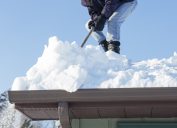50 Ways You're Ruining Your Home Without Realizing It
Home experts say these seemingly minor mistakes could leave you with major damage.
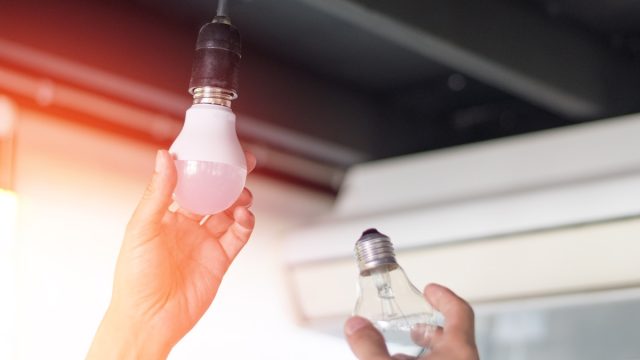
As a homeowner, you want to ensure that you take the proper precautions and do whatever you can to avoid any serious—not to mention costly—damage to your house. And while that certainly includes being diligent about turning off lights and electrical appliances before you leave the house to eliminate the chance of a fire and not starting the dishwasher or washing machine if you're not going to be home while it's running, it's relatively rare that accidents like these occur. Instead, it's the mistakes you aren't even aware you're making that can lead to major repairs in the long run. And with the increased time you've been spending at home because of the coronavirus, that means you're also spending more time cooking, cleaning, and doing home projects—creating more opportunity for error. Thats why, with the help of architects, builders, and other home experts, we've rounded up the ways you're causing damage to your house without even realizing it. And for some ideas on things you can do around the house, check out 50 Easy DIY Projects You Can Tackle This Weekend.
1
Keeping your blinds open all day
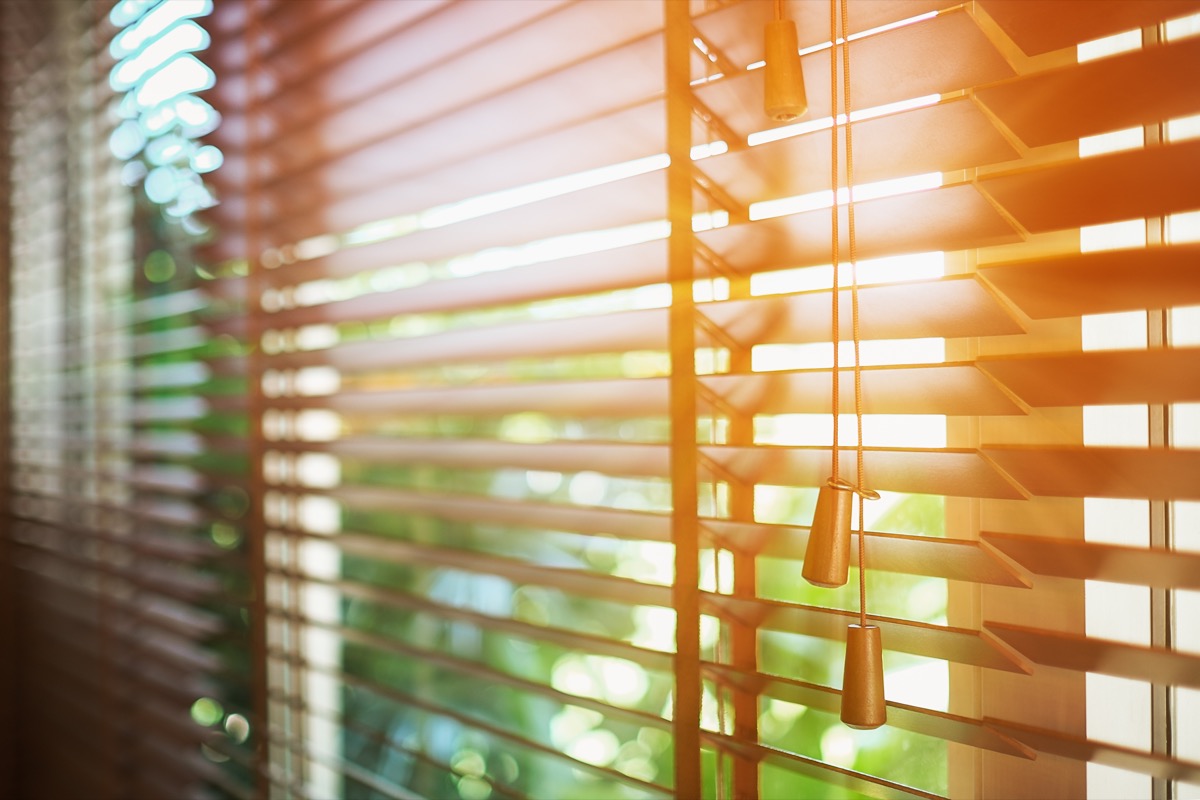
Keeping your blinds open may make your home look bright and cheery, but doing so can also cause serious damage to your flooring if you're not careful. "Harsh UV rays can cause premature fading and discoloration to floors, especially hardwood flooring," says flooring expert Paul Carter, executive vice president and chief purchasing officer at Empire Today.
That doesn't mean you have to live in the dark, though—Carter simply recommends making sure you've closed your blinds when you head out for the day. And for decorating pitfalls to avoid, check out The One Home Design Mistake Everyone Makes.
2
Letting rooms with hardwood floors stay humid
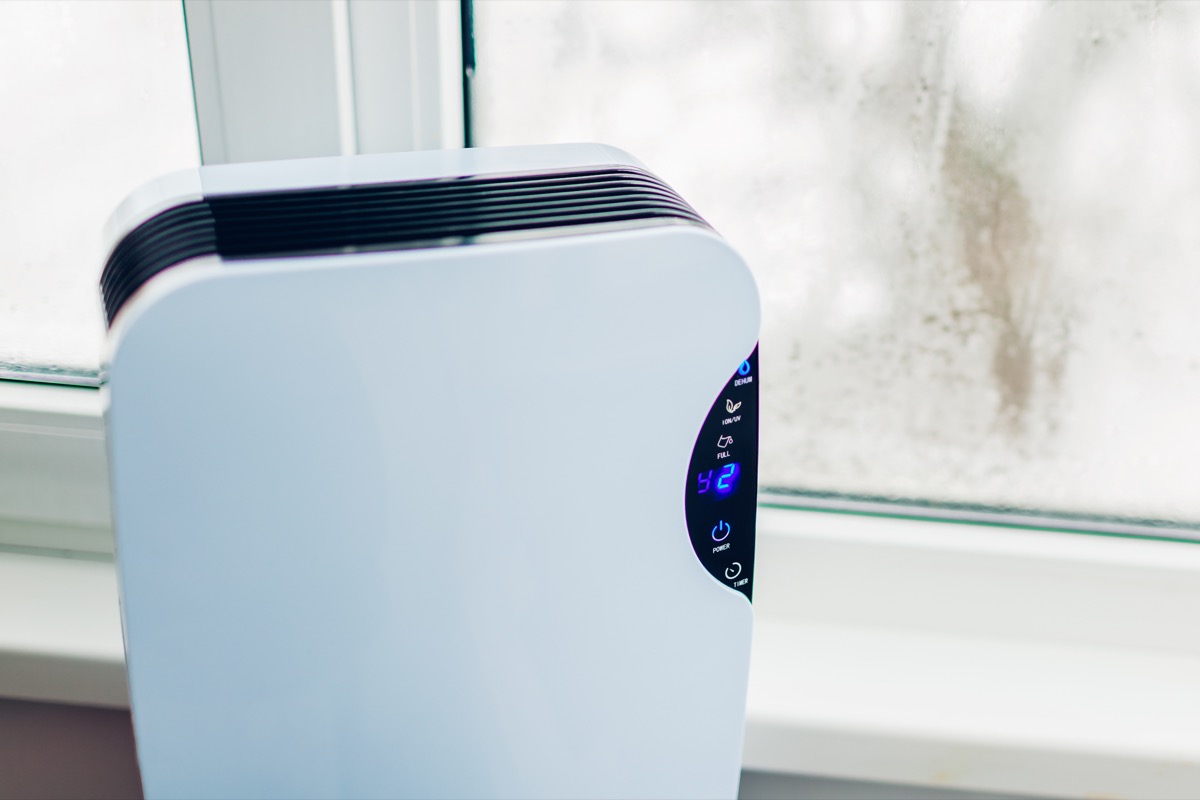
Want to keep your hardwood or laminate floors looking brand new? The answer isn't some expensive cleaning product—it's a dehumidifier. "If humidity hits above 55 percent, you might be opening up a chance for moisture to seep into the wood," says Carter, noting that this can cause your flooring to swell and warp over time.
3
Sweeping instead of vacuuming
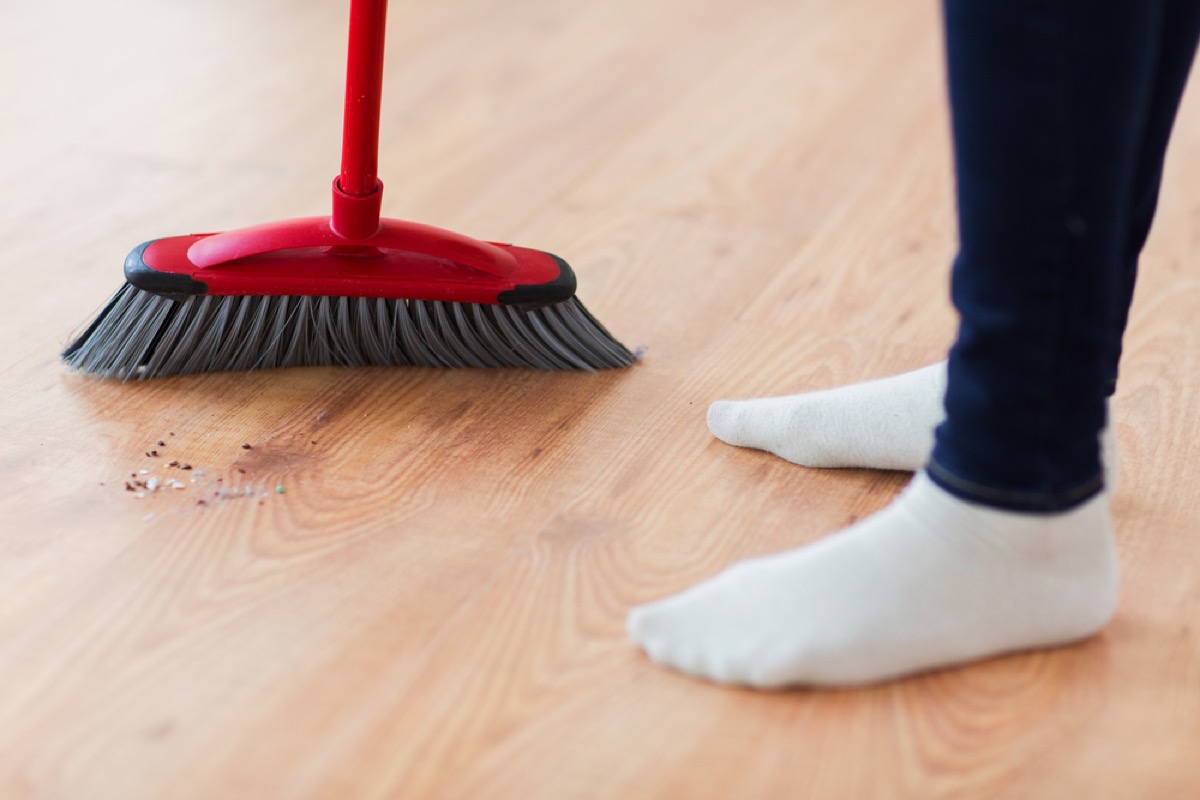
What's wrong with breaking out the broom to clean up dirt on your hardwood floors? It can actually shorten their lifespan. "If you're going to mop or sweep, make sure you vacuum first to prevent moving those itty-bitty particles and abrasives—like sand—along the floor's surface, which can scratch or damage floors," says Carter. And for more ways you can keep your home tidy, check out 30 Amazing Cleaning Tips You'll Wish You Knew Sooner.
4
Using too much water to clean your floors
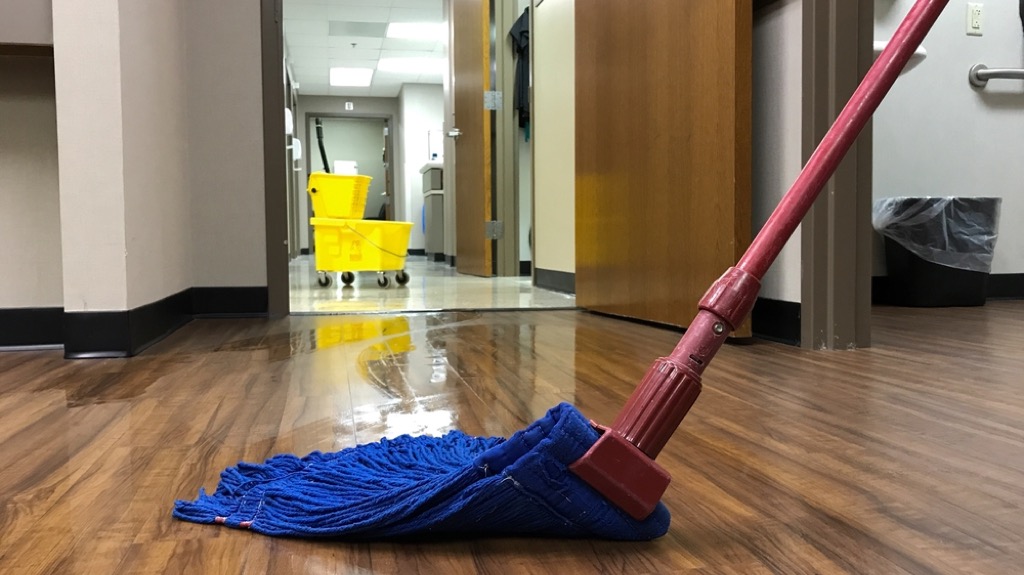
Water may be effective at getting your floors clean, but use too much and you might find yourself in need of some replacement flooring before you know it. Excessive amounts of water on your hardwood or laminate floors can cause them to warp or stain. "If you want to clean your wood floors, use the minimum amount [of water] possible," suggests Alberto Navarrete, general manager of Frisco Maids.
5
Forgetting to use furniture pads on hardwood floors
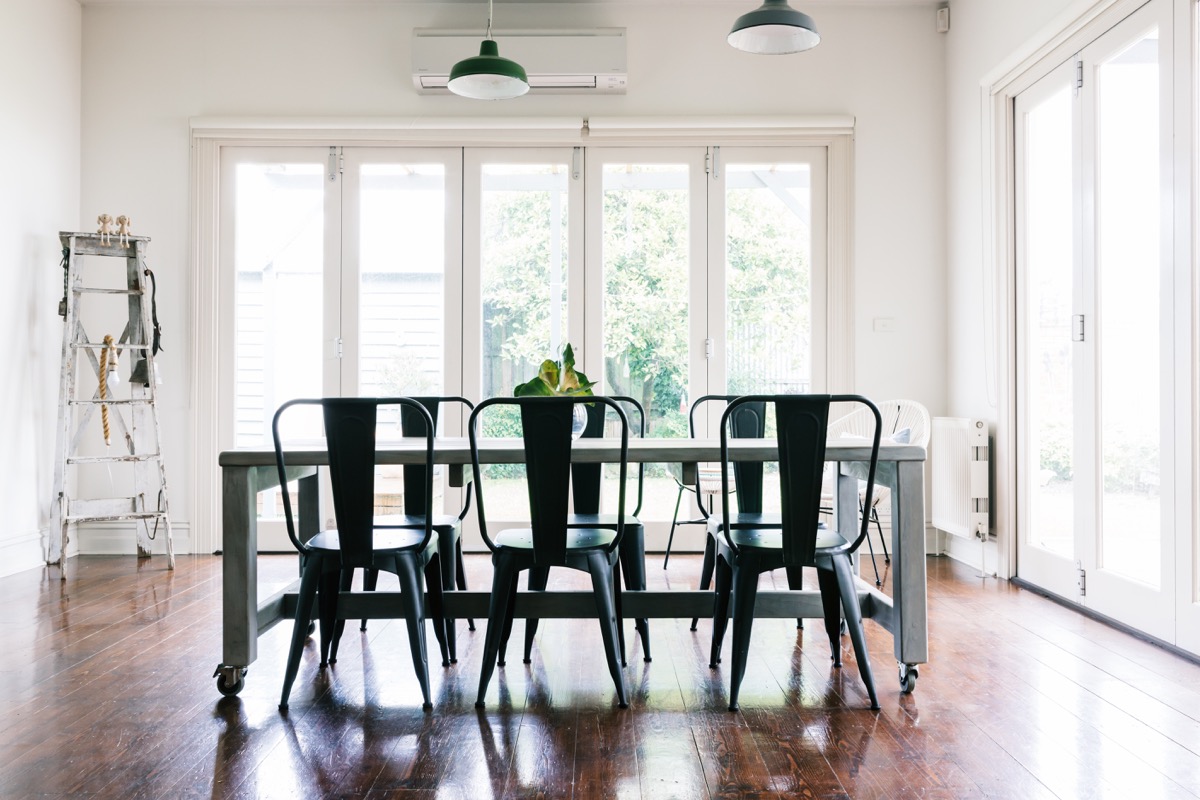
Those little furniture pads that cover the bottom of table and chair legs are a must if you have hardwood floors in your home. If you're not using them, every time you scoot back in a chair or move a piece of furniture an inch to the left, you're potentially scratching your floors in a way that only refinishing them can cover up.
6
Nailing into the wall without finding a stud
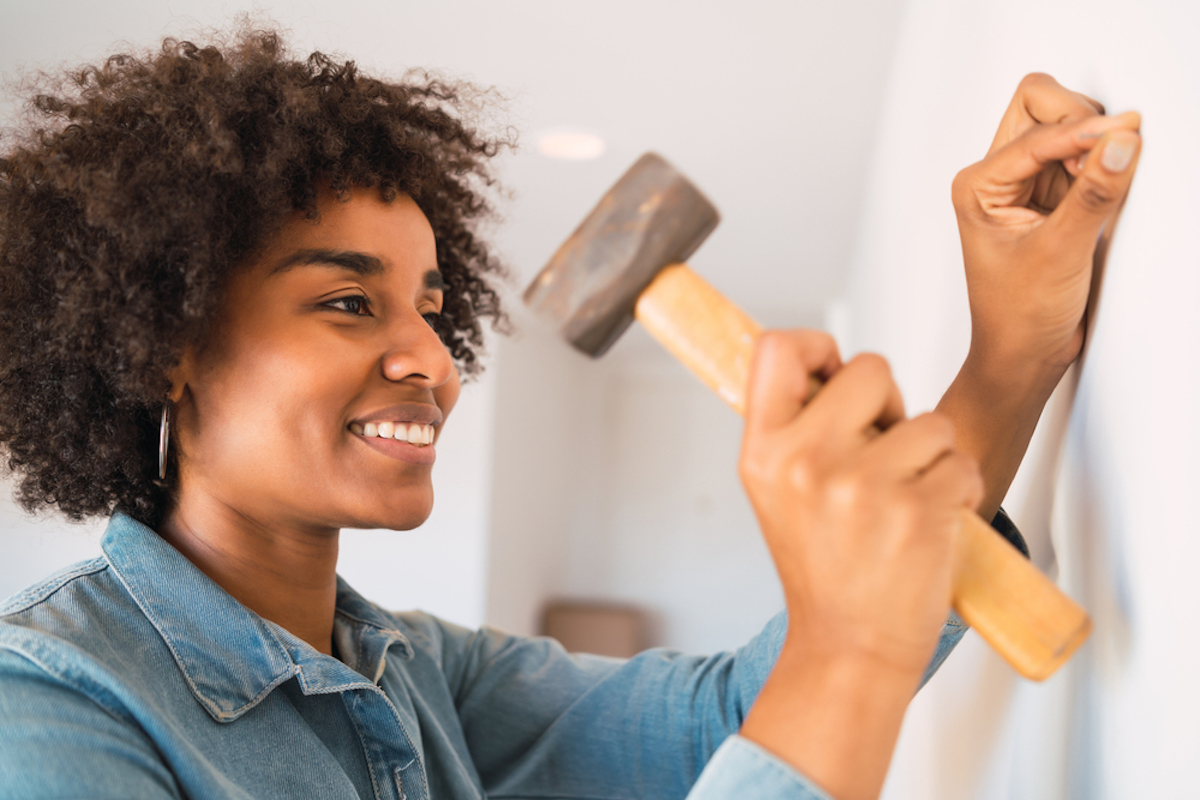
Unless you want a pricey repair in your future, always use a stud finder before nailing or drilling into a wall. If you don't, the sheetrock or plaster below may not have sufficient support for the item, which can "damage the wall and break the item that is hanging," says Mike Morgan, owner of Morgan Inspection Services in central Texas.
7
Putting mulch against the side of your house

While using some mulch in your garden can help protect your plants and cover up patchy areas, putting it too close to your home can cause serious damage over time. "Mulch retains moisture, causing rot and allowing termites easy access to the home," explains Morgan. And for a must-do project to tackle in the warmer months, check out The One Home Maintenance Task You Should Be Doing Every Summer.
8
Not trimming your trees
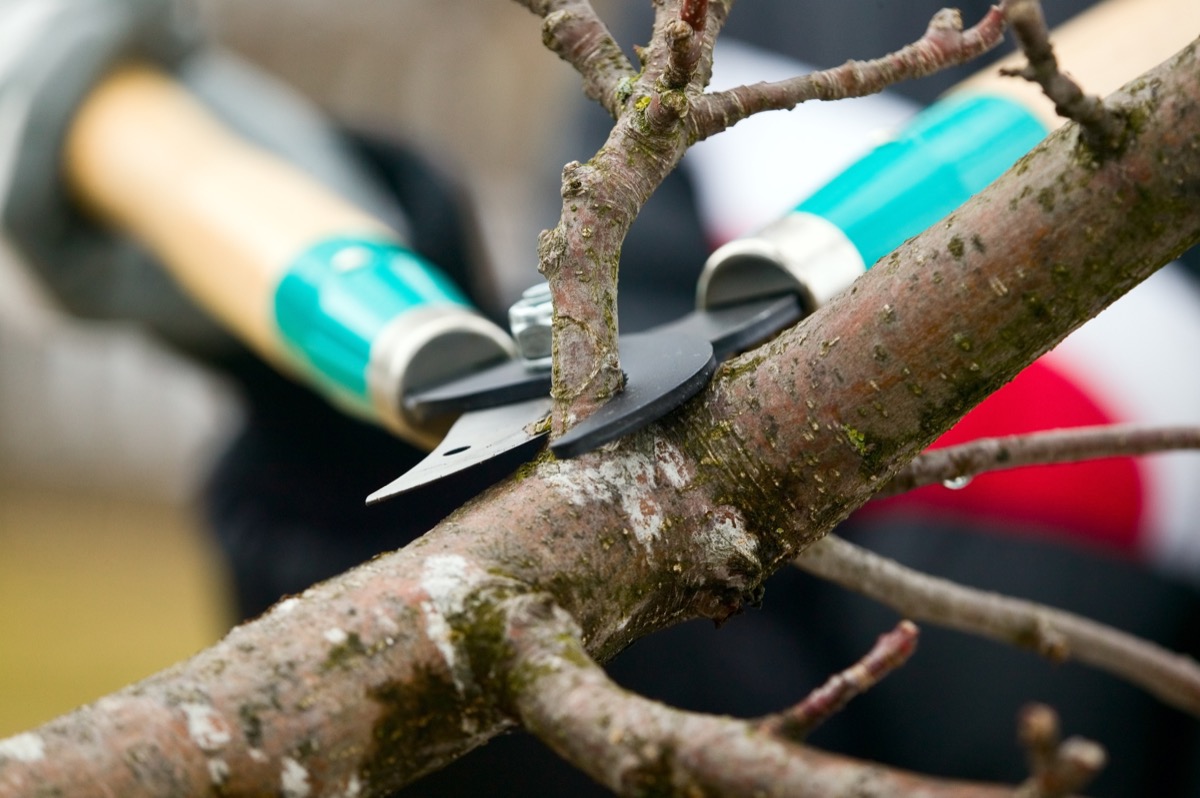
Looking for an easy way to protect your house in a hurry? Start by trimming your trees. When tree branches grow too close to your home, this can "cause significant damage to the roof or siding … and cause significant rot" from the branches' moisture, according to Morgan.
9
Letting vines grow on your home
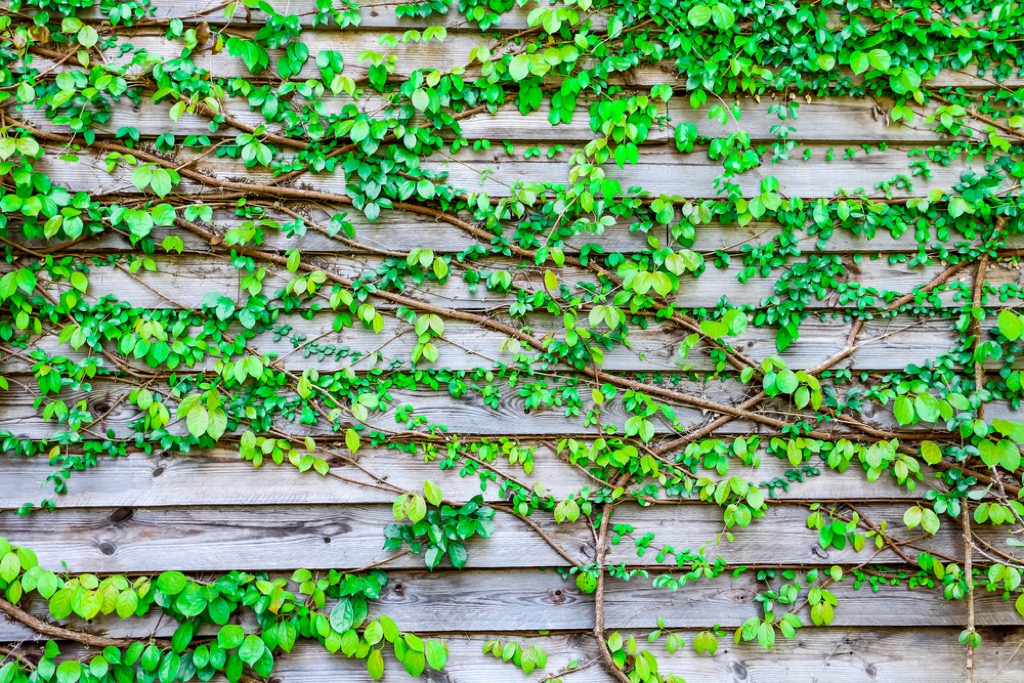
Vines may make your home look stately, but they can cause serious damage to your structure before you know it. "These trap water, vermin, insects, [and] are not a friend to your home," says real estate concierge Shannon Hall of Dwellings by Rudy & Hall.
10
Letting your landscaping slope toward your house
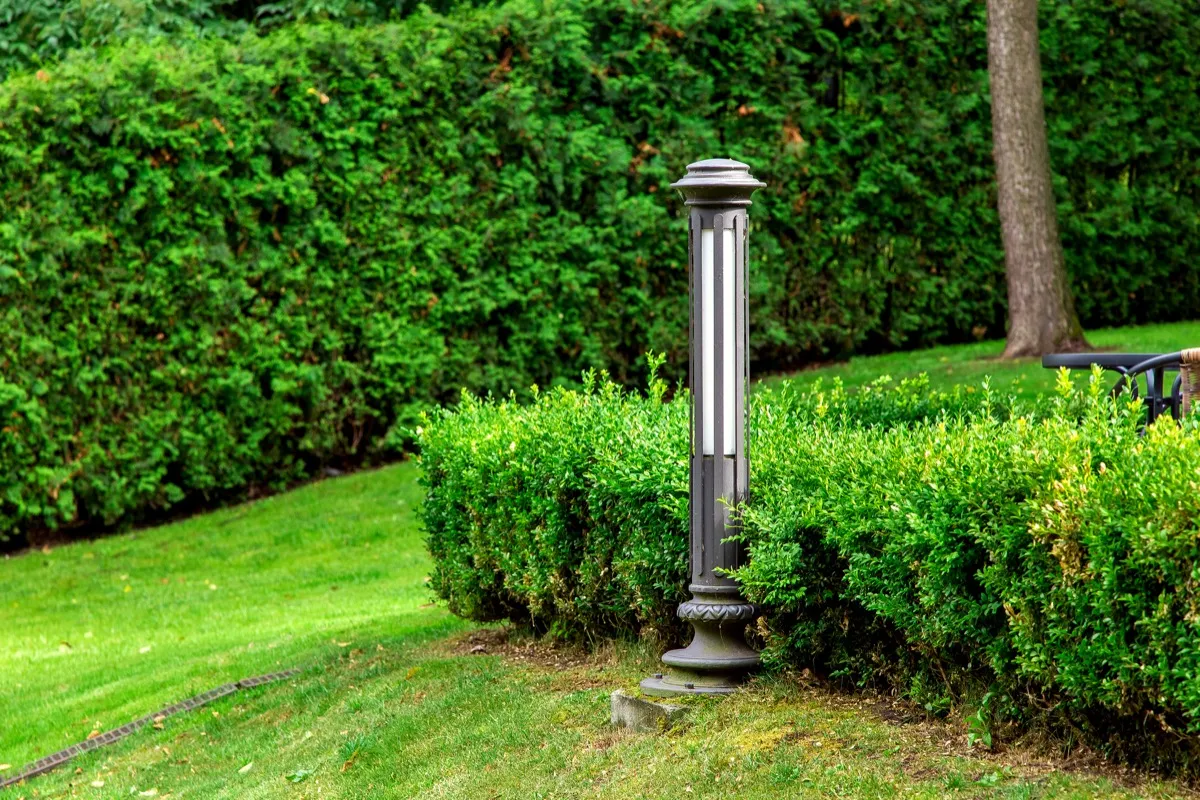
Though your sloping landscape may offer you some privacy from your neighbors or passersby, it can also mean you've got major repair bills to look forward to. "Never let the grading around your home slope toward your home," cautions Hall, who says that this is a recipe for moisture damage.
11
Not cleaning your gutters frequently enough
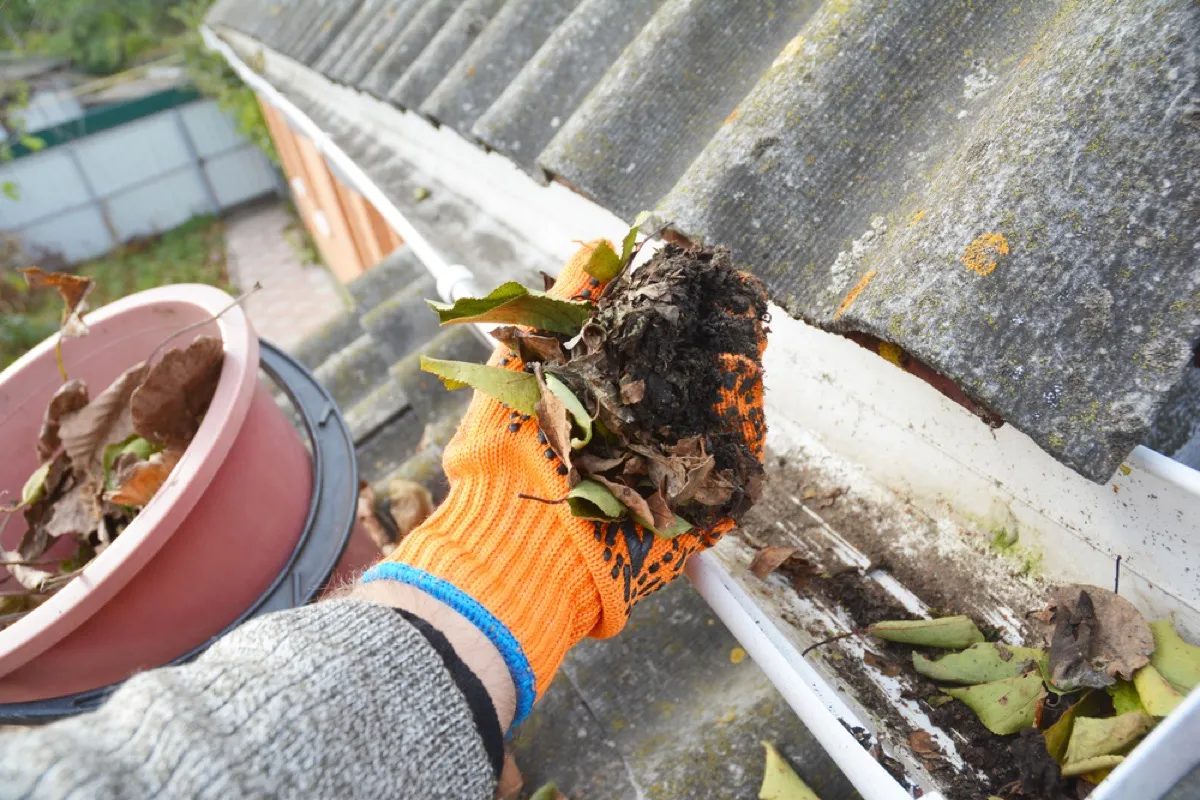
Think that gutter cleaning can wait until next year? Think again. "Debris builds up and blocks or impedes the gutter's water flow," leading to water damage inside your home, according to Mark Scott, president of Mark IV Builders, Inc. That build-up can even cause your gutters to fall or exterior wood trim to rot over time due to prolonged exposure to moisture, so Scott recommends cleaning them at least three times a year.
12
Removing your downspout extensions
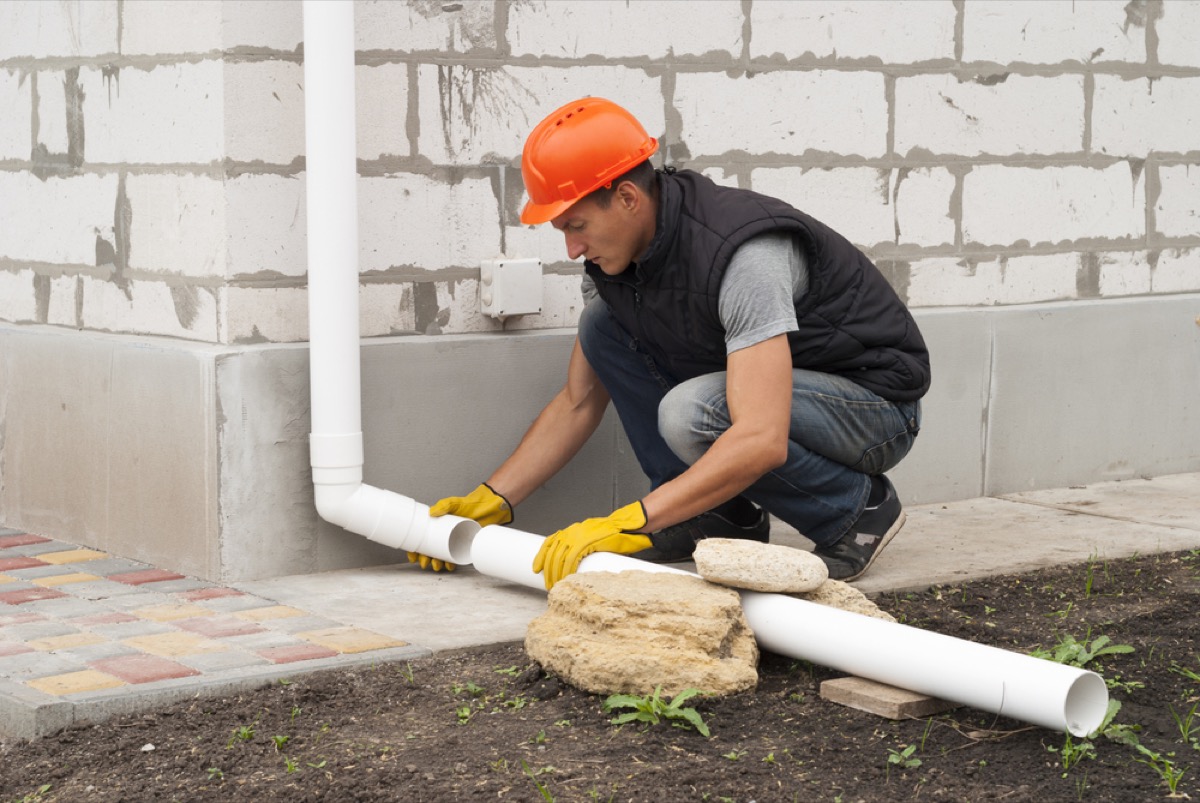
While downspout extensions—the long piece of gutter that runs along the ground—may not be aesthetically pleasing, removing them can lead to much bigger problems down the line. Downspout extensions keep water away from your home's foundation, and by removing them, "you risk allowing water to pool directly at your foundation, increasing risk of water penetration into your basement," says Kate Ziegler, a realtor with Arborview Realty in Boston.
Not only can this compromise the integrity of your foundation, but it may even dampen the wood framing of your house, causing structural issues or attracting pests.
13
Pouring grease down your drain
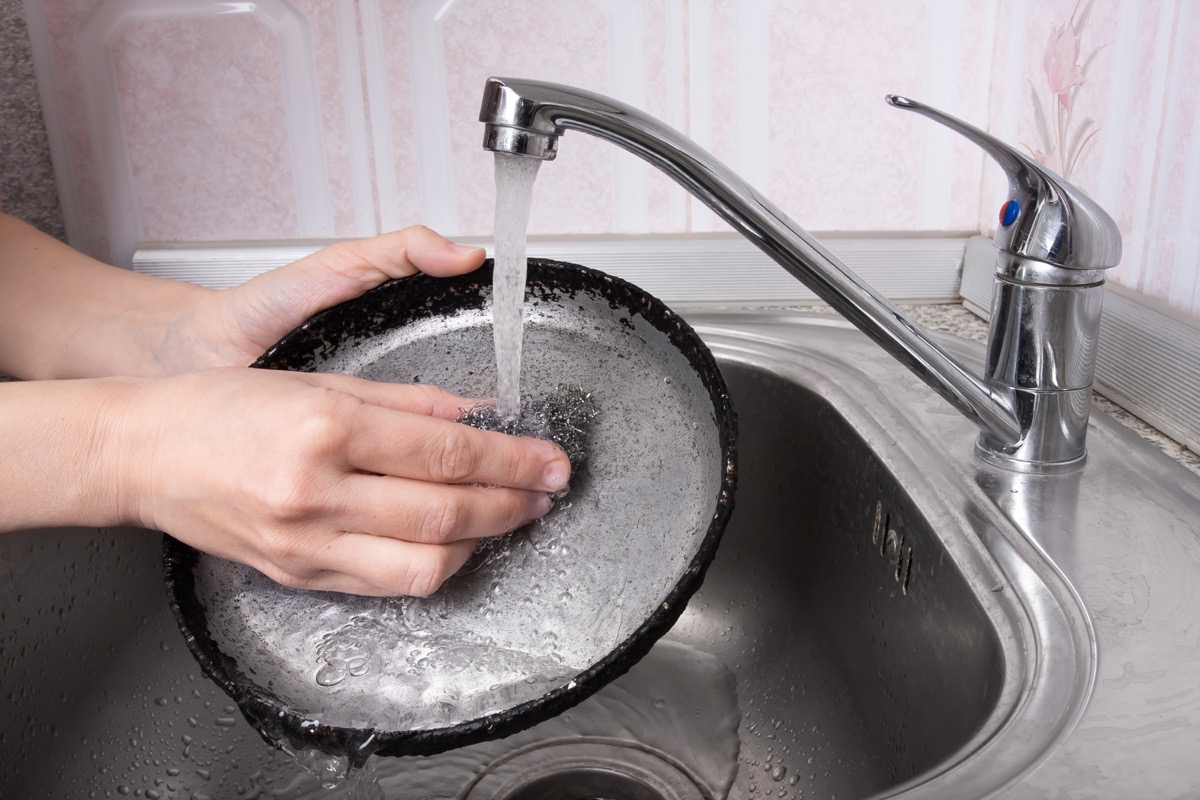
You're better off letting that dirty pan cool down on the stove rather than trying to pour cooking grease down your drain. "Oil, fats, and grease will solidify and form blockages in your pipes, which not only has a negative impact on the environment, but also creates issues for your septic system," according to Chris Diesso, owner of Rescue Cesspool & Drain. What kind of issues exactly? It could be as bad as an overflow of your plumbing.
14
Using chemical cleaners on painted cabinets
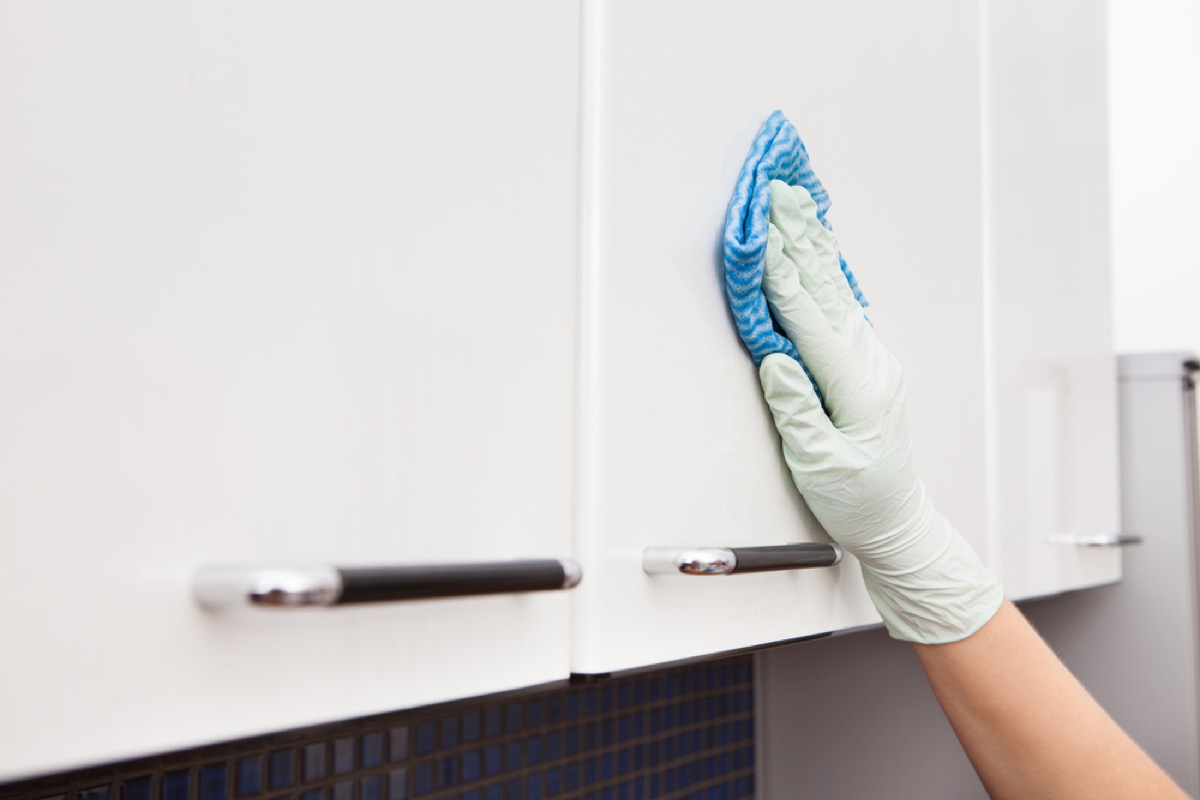
Want to get your cabinetry gleaming? If those surfaces are painted, avoid the ammonia- and bleach-based cleaners you use in other parts of your home. "Harsh chemicals wear down the existing finish, resulting in a dull look," explains Chloe Brittain, an associate at kitchen refinishing company Not Just Paint. Similarly, using wax-based products can leave surfaces dull, sticky, and in need of a professional cleaning.
15
Using hydrogen peroxide and vinegar together
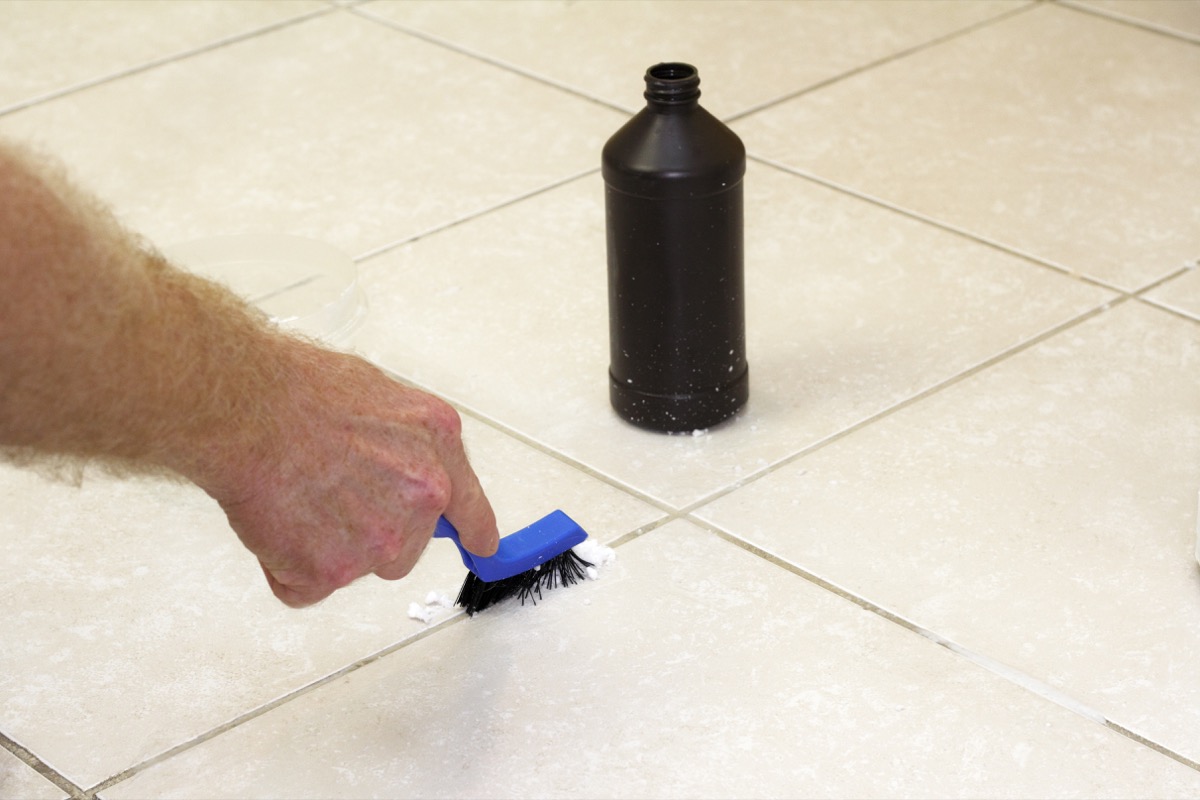
Hydrogen peroxide and vinegar clean effectively on their own, but mixing the two can cause serious damage to your home—and to your health.
According to Lily Cameron, domestic cleaning expert and supervisor for Fantastic Cleaners, "the mixture will create toxic peracetic acid" that can change the color and texture of your soft surfaces or even leave them with visible chemical burns. Worse yet, the acid "can cause you respiratory problems or skin irritation."
16
Cleaning your dishwasher with vinegar
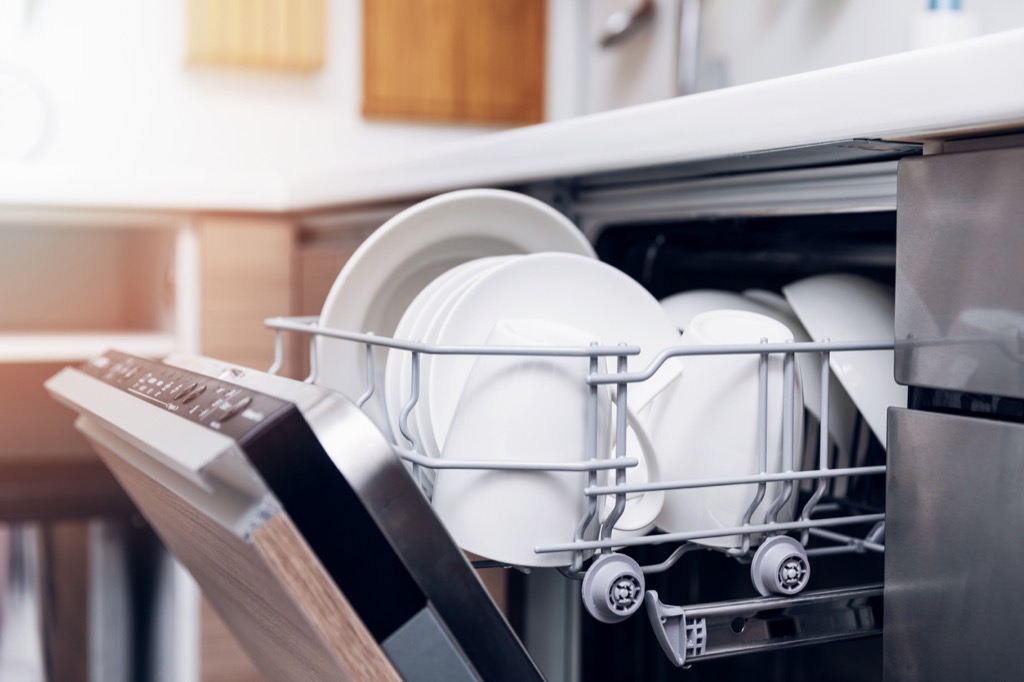
Vinegar may be effective at cleaning some surfaces, but it's a major no-no for your dishwasher. "Vinegar's acidity can be hard on some rubber parts of your dishwasher," as well as seals made of polyacrylate, fluorosilicone, and Buna-N, eventually causing your appliance to fail, says Cameron.
17
Not cleaning your dishwasher trap
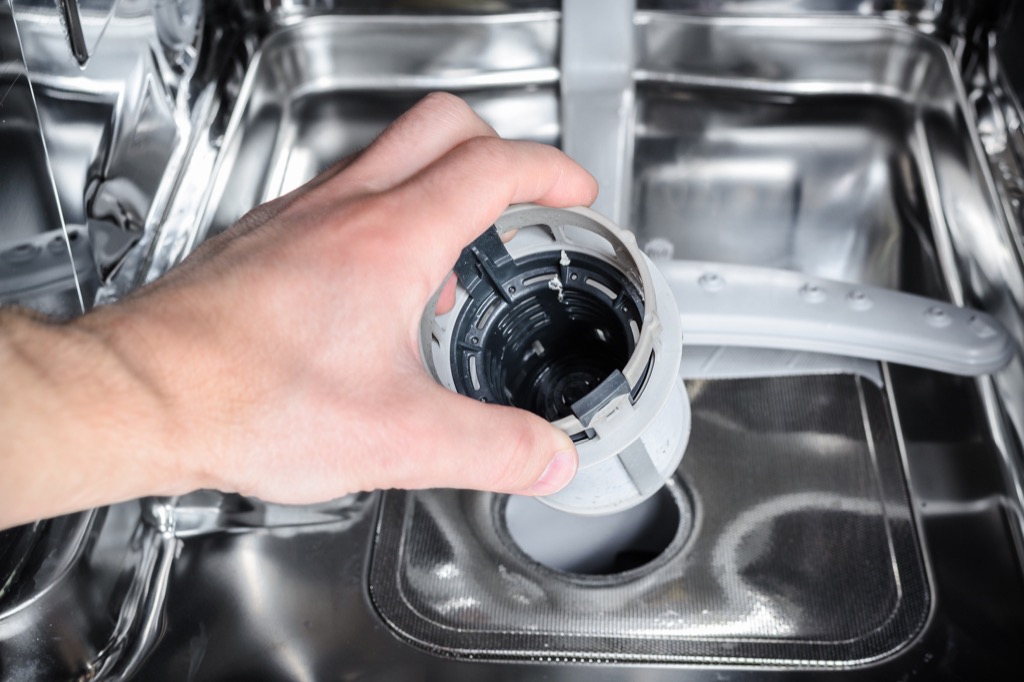
Though many people see their dishwasher as a self-cleaning machine, even it could use a little help from time to time. At least once a month, you should be cleaning your dishwasher trap, which is generally located on the lower part of your dishwasher near its sprayer. The rubber gasket and soap holder also need a good wipe down, or else you could be shortening the lifespan of your machine.
18
Using vinegar on granite counters
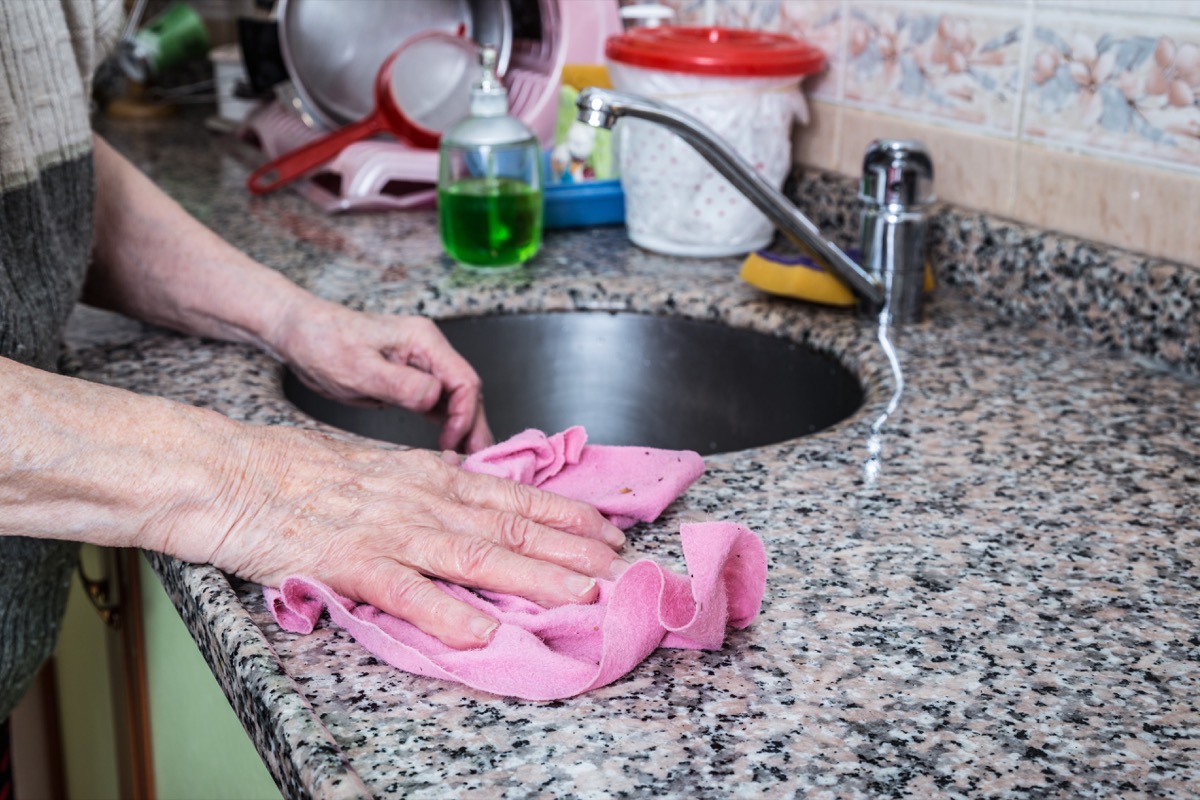
It's time to step away from the vinegar-based cleaners if you want those gorgeous granite counters to look great for years to come. Any type of acidic cleaner like vinegar "removes the sealant and gradually reduces the sheen of these countertops over time," explains Melanie Hartmann, house buyer at Creo Home Buyers in Baltimore, Maryland. These cleaners can even erode the stone underneath, leaving you to foot the bill for a pricey replacement.
19
Or using lemon juice on marble
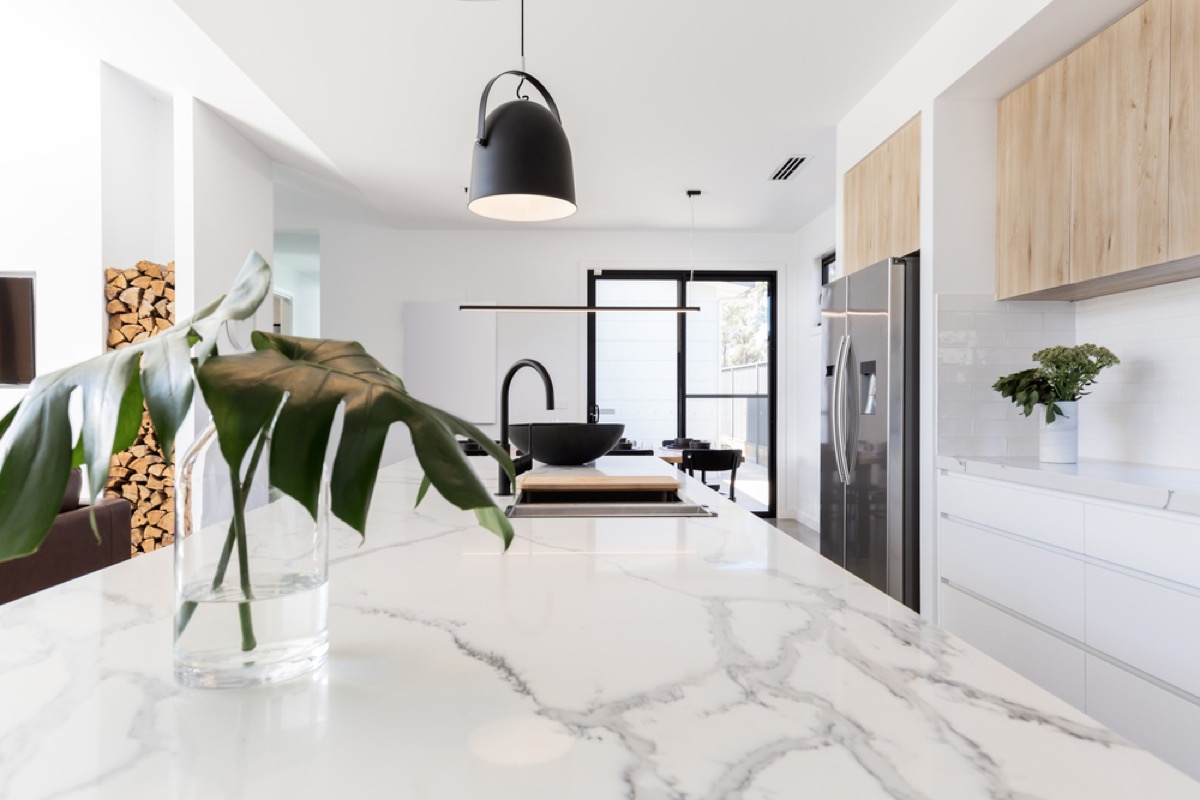
Consider lemon-based products and your marble counters mortal enemies if you want to keep the latter in tip-top shape. "Lemons contain a high amount of citric acid, so when lemon juice touches marble countertops, it quickly starts to eat away at the surface," explains Leanne Stapf, COO of The Cleaning Authority. She recommends using a mixture of dish soap and warm water to clean them instead.
20
Not draining your water heater
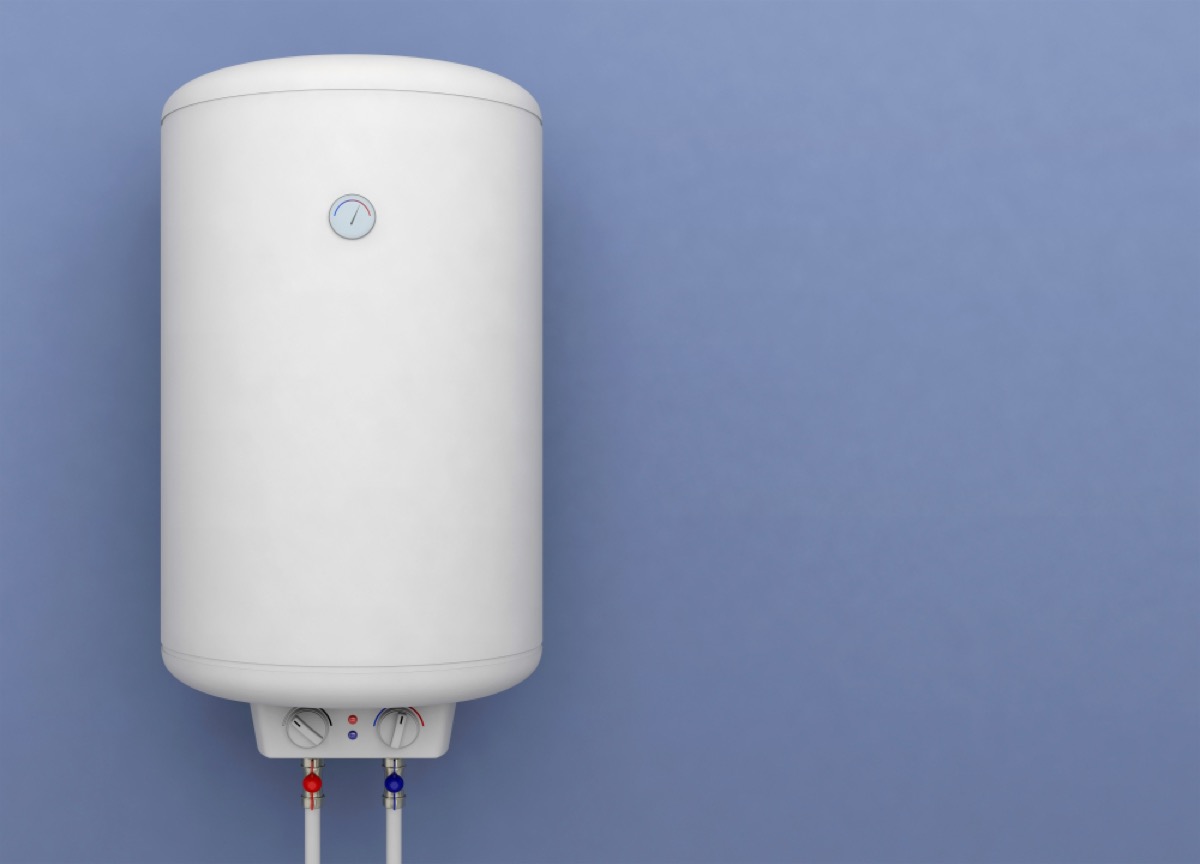
If you're not draining your water heater at least once a year, you could be setting your home up for major damage over time. The mineral deposits in your water heater "form a thick, crusty coating that will begin to chip off and clog faucets, drains, and the water heater valve," explains house flipper Shawn Breyer, owner of Atlanta House Buyers. This can cause the inner lining of your water heater to crack, requiring an eventual replacement.
21
Not using an exhaust fan in the bathroom
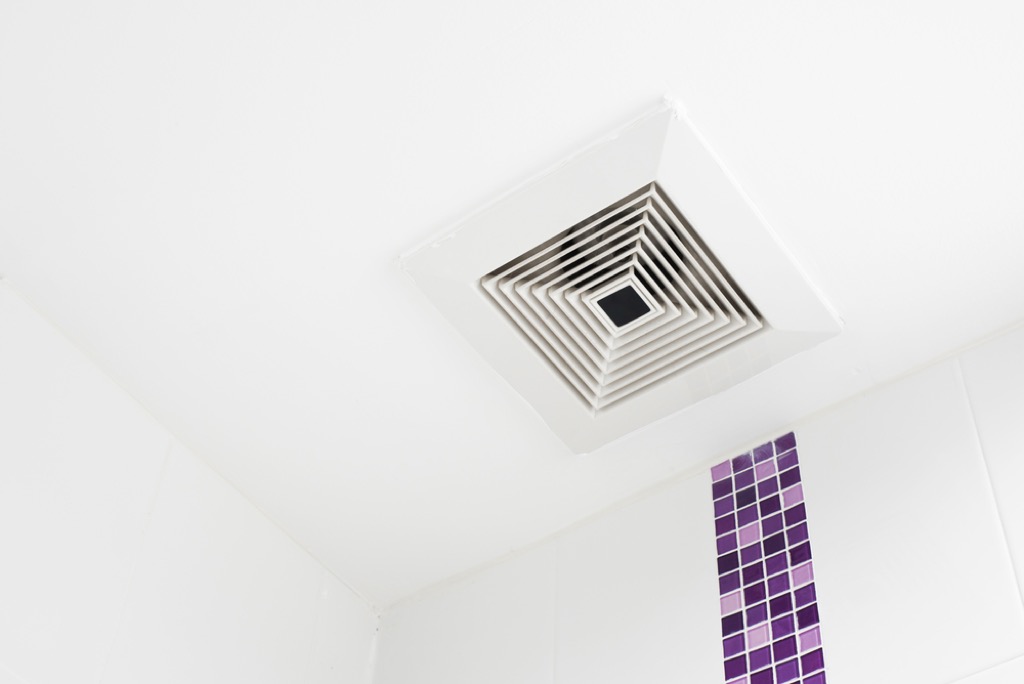
That exhaust fan in your bathroom isn't optional. If you don't run it for a bit when you get out of the shower, you could be causing serious damage to your space without even realizing it.
"[If] someone only turns the fan on for the duration of their shower … the average exhaust fan for a bathroom won't remove enough of the moist air," says Breyer. "Moist air combined with complete darkness causes mold to start forming."
22
Not drying off fully before you leave the shower or bath
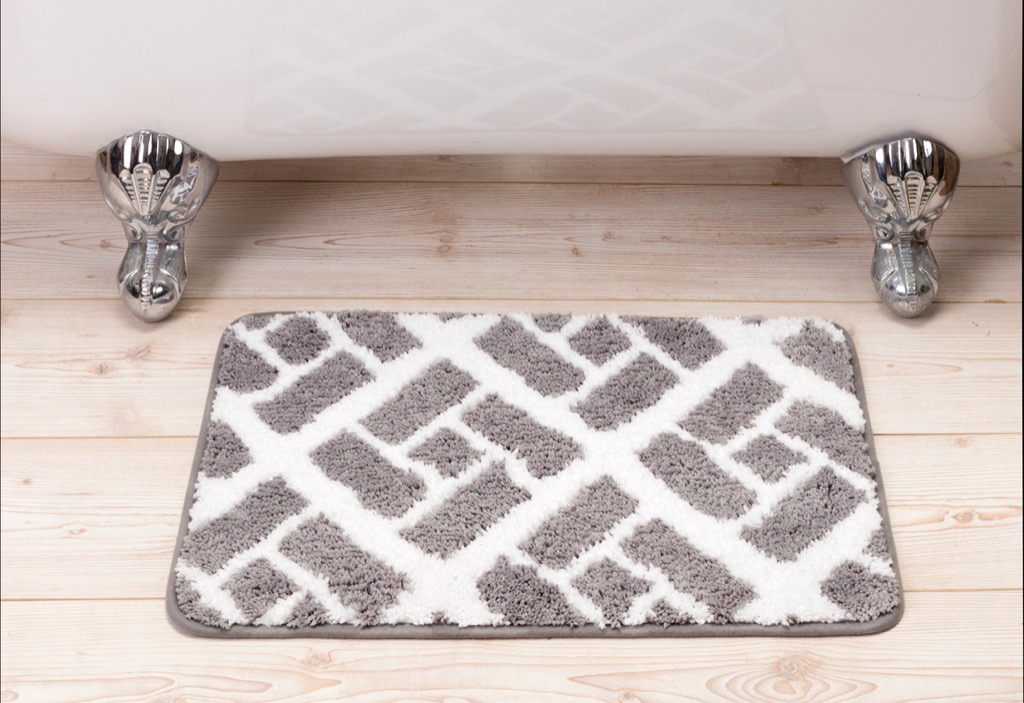
It's reasonable to assume that drying off on a bath mat is the most effective way to rid your body of excess moisture after a shower. But doing so could actually be harming your house. "The damp shower rug will allow moisture to seep into the linoleum flooring, causing the flooring to stain and begin warping," says Breyer.
23
Leaving wet towels on the floor
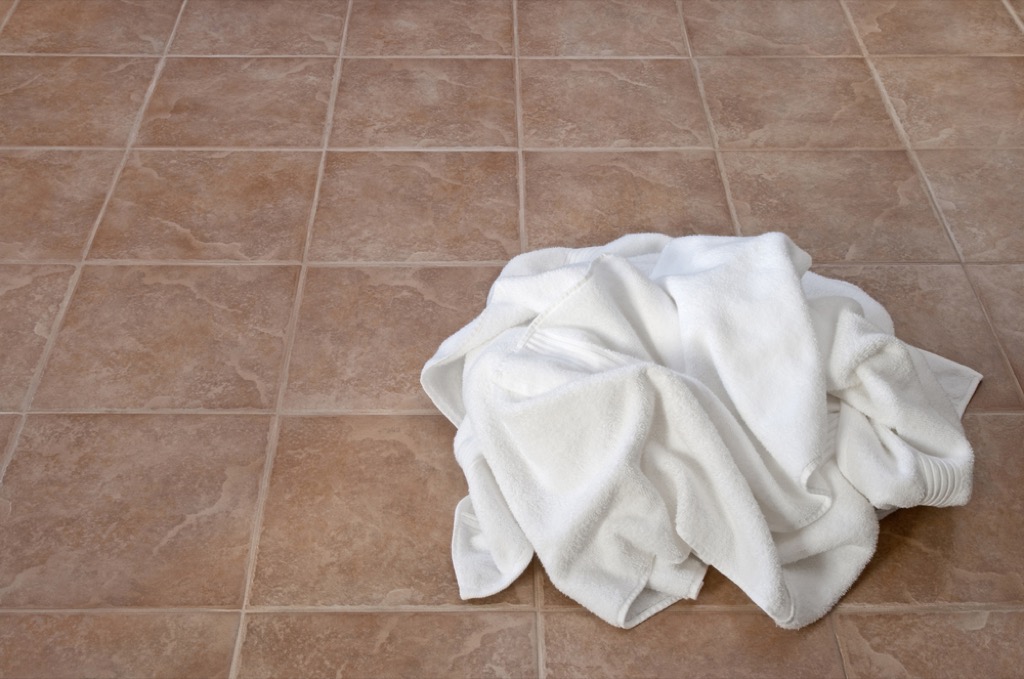
Leaving wet towels on your floor is more than just a housekeeping mistake. Much like standing water after a bath or shower, a wet towel can trap moisture, causing the flooring beneath it to stain, buckle, or rot.
24
Using toilet bowl cleaners on grout

That toilet bowl cleaner isn't the all-purpose bathroom product you might hope it would be. "Toilet bowl cleaners contain acids. Those acids will break down the grout, causing it to become more porous," explains cleaning expert Mary Cherry, owner of Evie's Cleaning Company.
25
Using high-gloss polish on wood floors
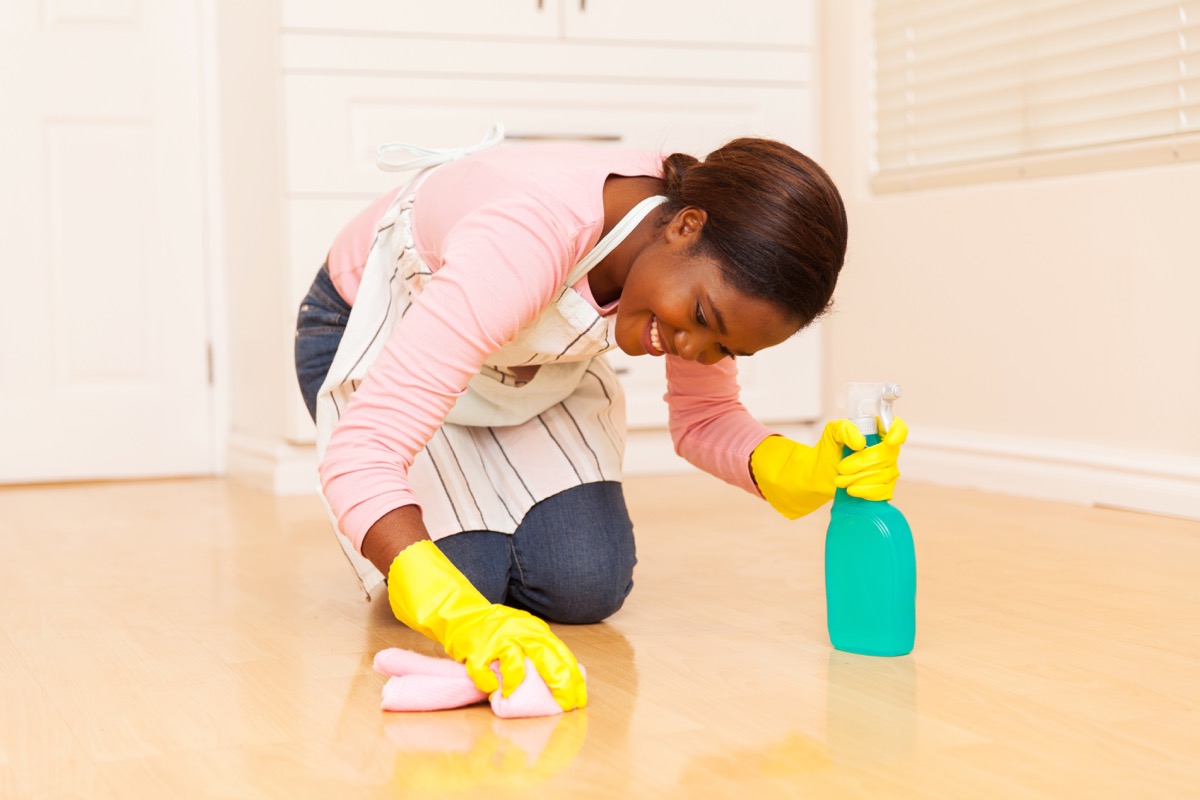
That polish may make your floors gleam initially, but it will only ruin them in the long run. "Adding polish to your floor will produce build-up and cause your flooring to become dull, and possibly tacky, causing dirt to stick to it," says Cherry, who recommends a pH-neutral cleaning solution instead.
26
Using bleach on hardwood floors
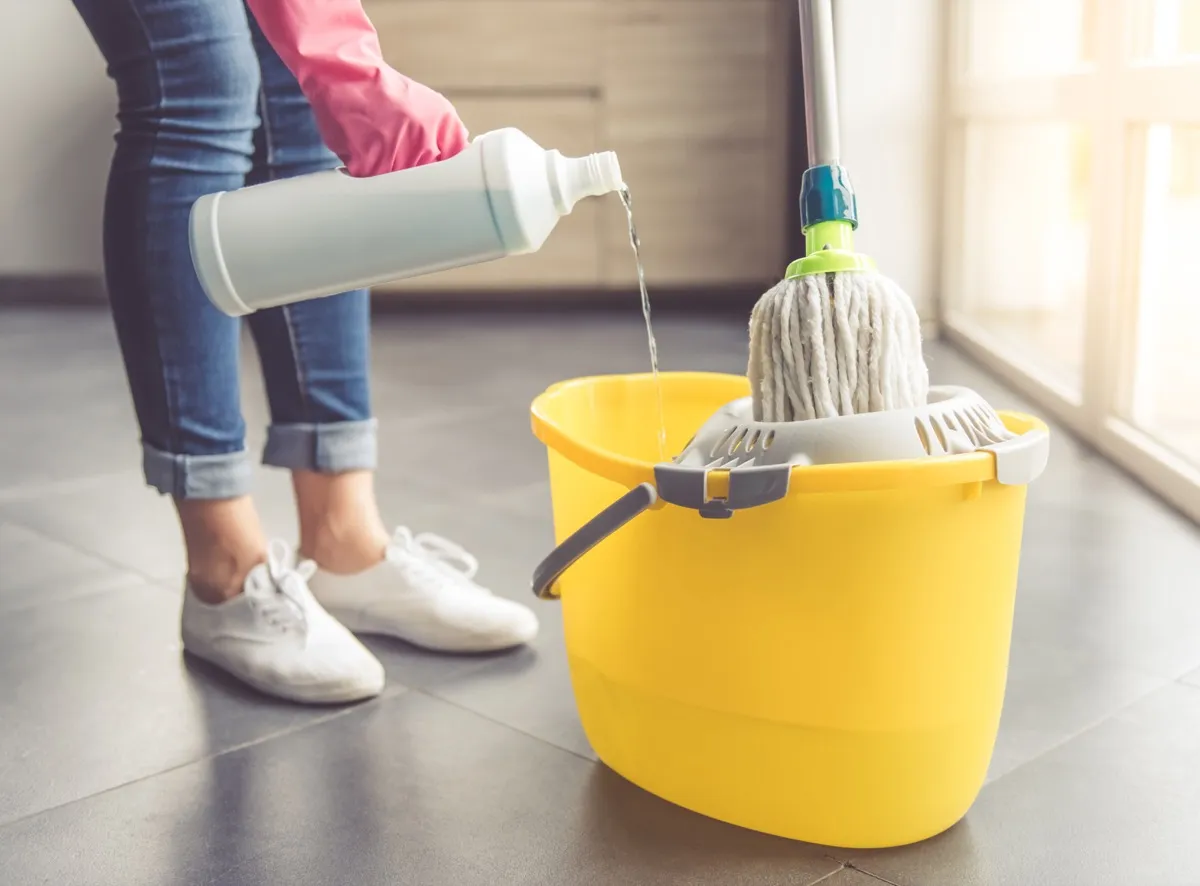
Bleach may be good for your whites, but it's not an all-purpose cleaning solution. If you're using bleach to remove a stain from your hardwood floors, "it will leave an even bigger stain or damage your wood," says Abe Navas, general manager of Emily's Maids in Dallas. Instead, use a wood-specific cleaning product, or have the flooring resurfaced if that stain just won't budge.
27
Using too much shampoo on your carpets
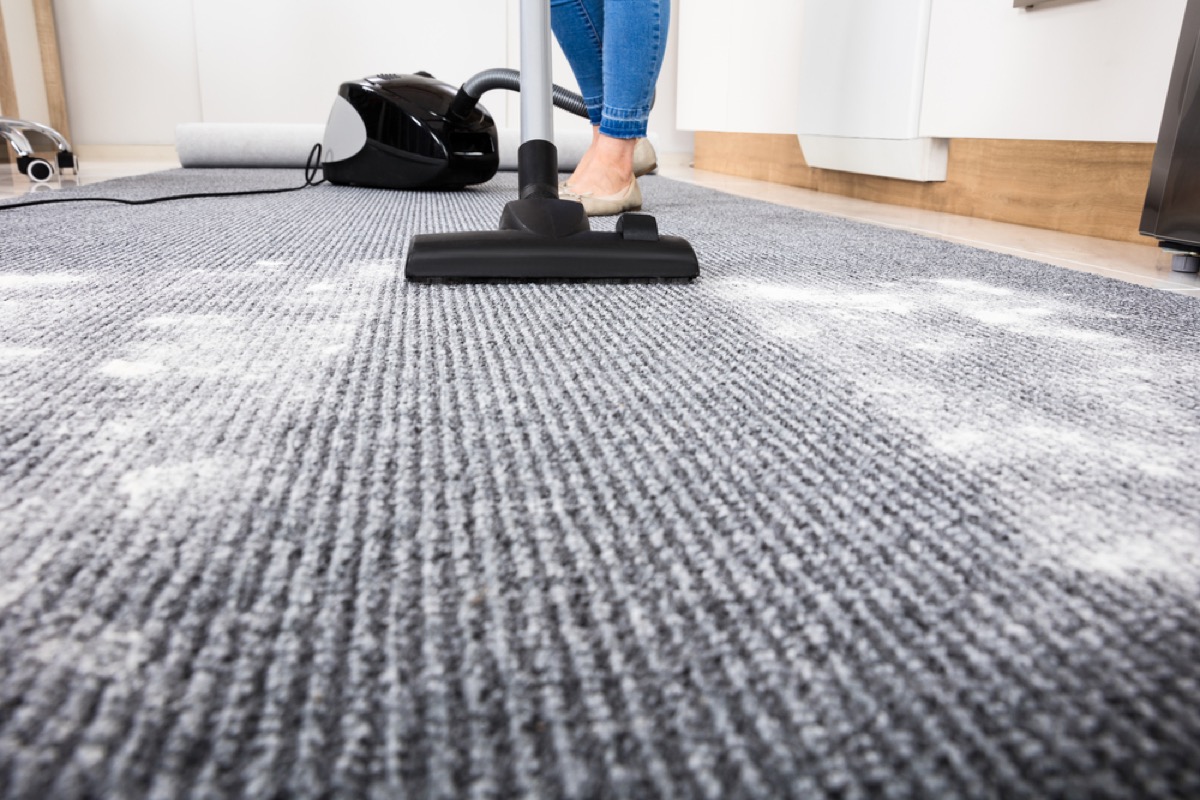
Of course you want to rid your carpets of dirt, but overdoing it with the carpet shampooer could do more harm than good. If you don't remove a sufficient amount of product from your carpets, "you might unintentionally cause a mold problem to start growing," explains healthy home consultant Kimberly Button of Get Well Be Well.
To keep this from happening, she suggests removing as much moisture as possible with the carpet vacuum and opening windows to help your carpets dry out if they still feel damp after a cleaning.
28
Ignoring damp surfaces
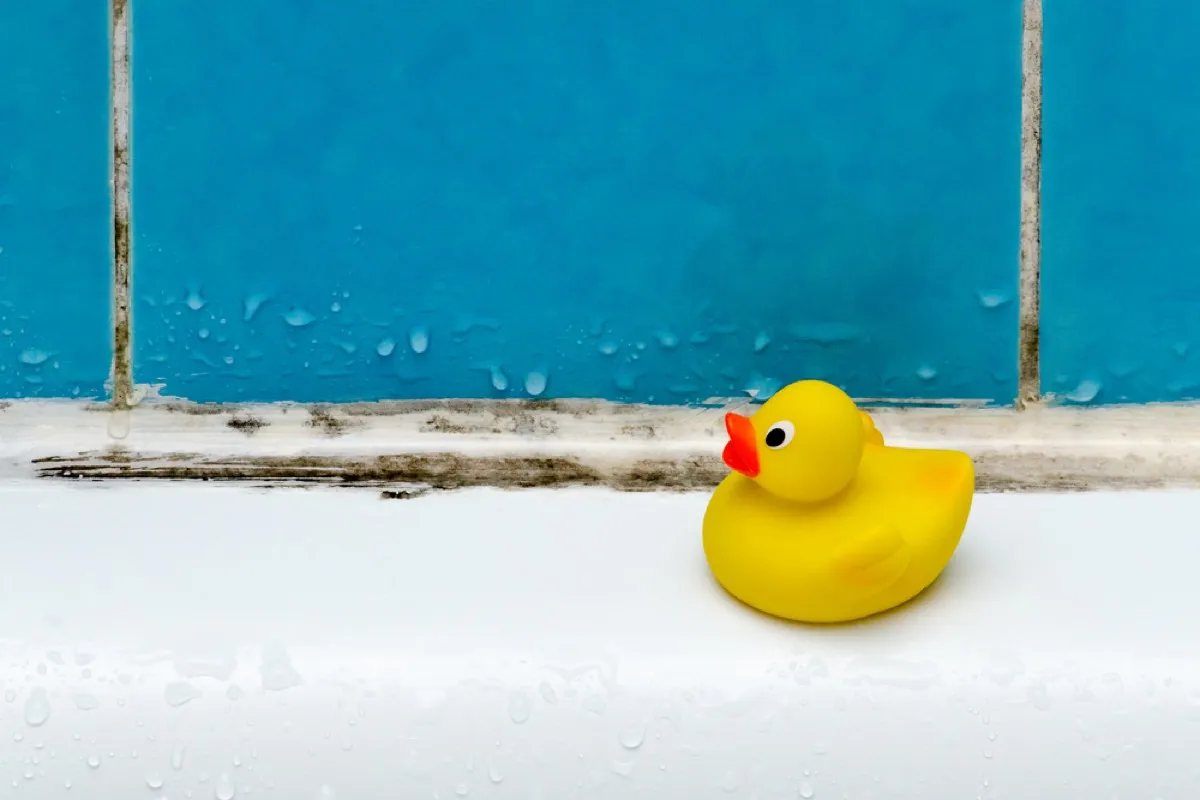
Your carpets aren't the only part of your home that can become seriously damaged by dampness, however.
"If you see any kind of signs of water in your home that you are unclear of where it came from, investigate, preferably with the help of a professional," says real estate agent Jamie Safier with Douglas Elliman. (As a side note, Safier says that mold damage often isn't covered by homeowner's insurance policies.)
29
Hiding your outdoor AC unit
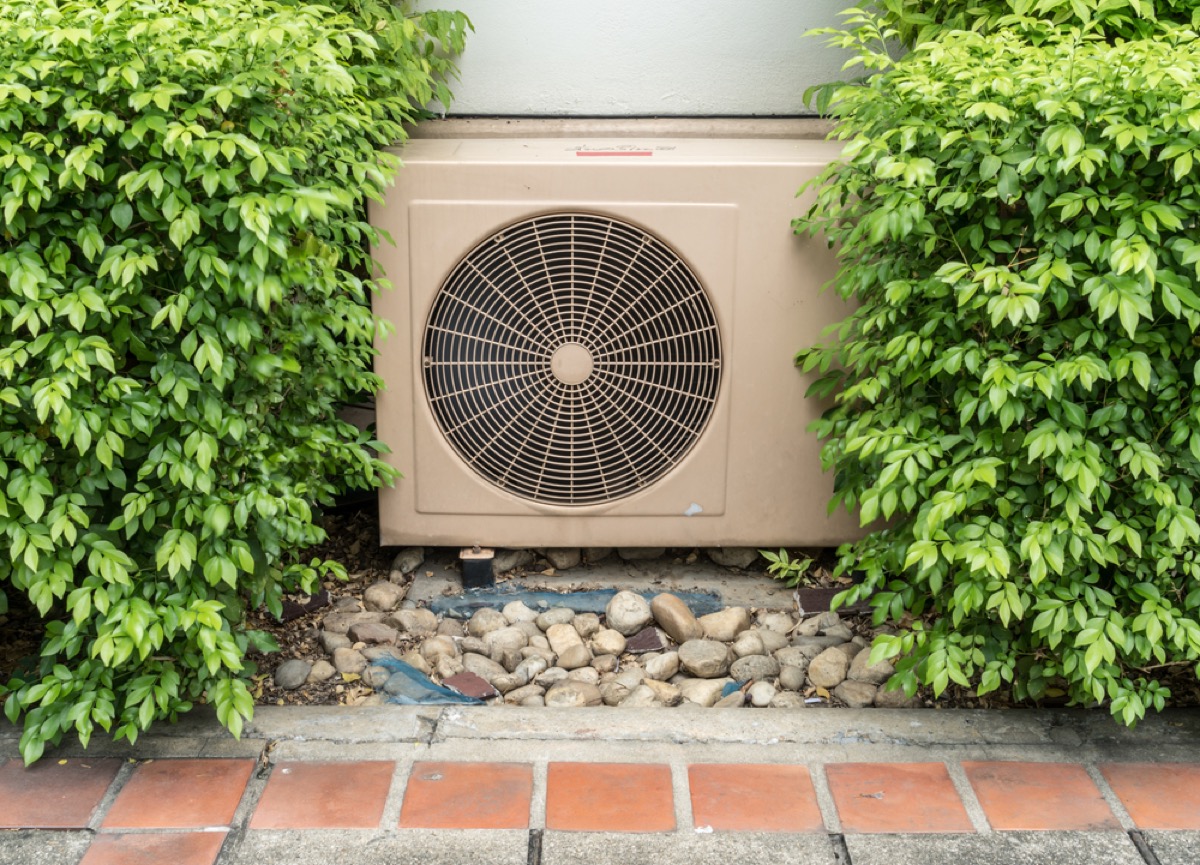
Your AC system may not be the most attractive element of your backyard, but camouflaging it with hedges can cause major problems. "AC units need plenty of room for proper air flow to run efficiently," says Jeff Trucksa, co-founder of K & J Heating & Cooling, Inc.
30
Adding additional filters to your HVAC system

If having one filter on your HVAC system is good, having more than one must be better, right? Well, not exactly. While your HVAC system should have a filter in the air handler, adding an additional one on the AC's vent actually means more stress on the system, says Chris Forbus, owner of HVAC company Choice Air Care. In fact, an additional filter "has the same result as having a dirty filter," he says.
31
Or not cleaning them frequently enough
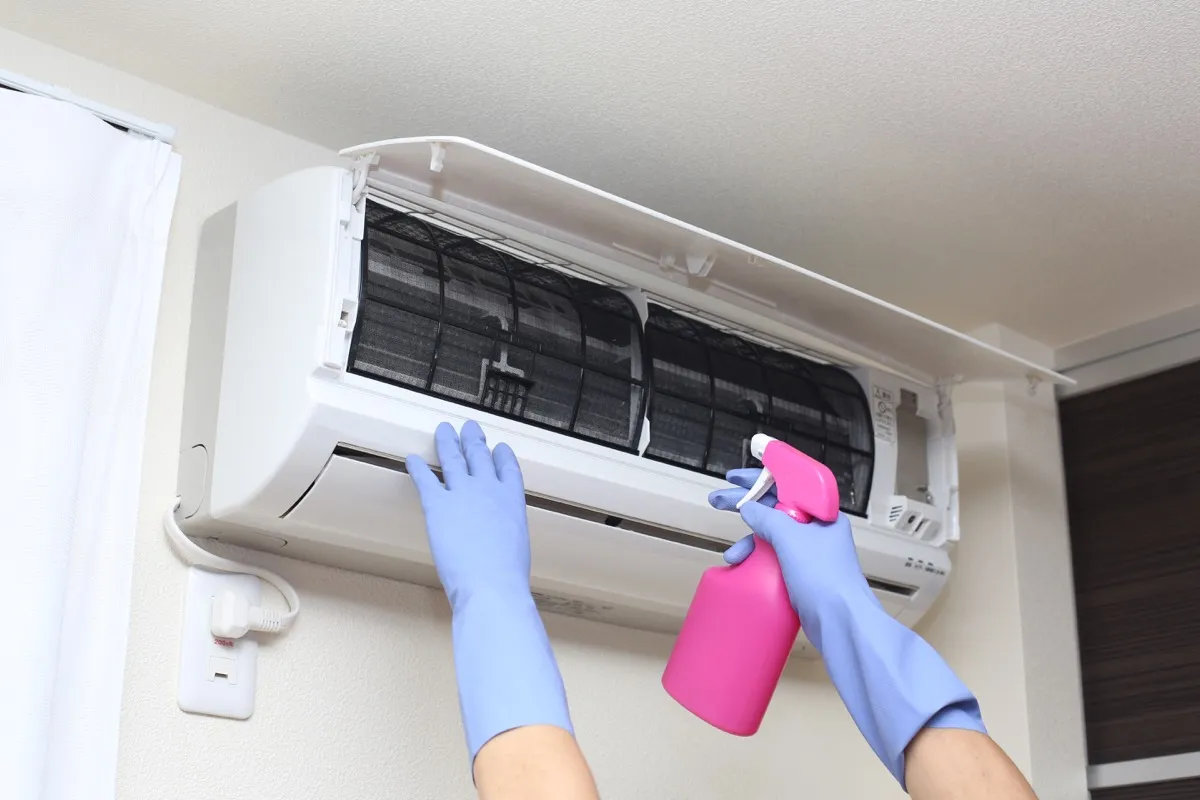
While adding extra filters to your HVAC system can cause serious problems, not replacing your existing ones enough can be just as much of an issue. "A dirty or clogged filter will impact efficiency and could even cause damage to your system," says Mark Dawson, COO of One Hour Heating & Air Conditioning, Mister Sparky, and Benjamin Franklin Plumbing. He recommends changing filters every one to three months.
32
Using the wrong kind of extension cord outside

All extension cords are not created equal. "If an extension cord is not rated for outdoor use, it's at risk of overheating and potentially causing a fire," explains Dawson. So, how can you tell if your extension cord is safe for the great outdoors? The letter W printed on the cord jacket will let you know that it's OK to use outside.
33
Using adaptors on two-prong outlets
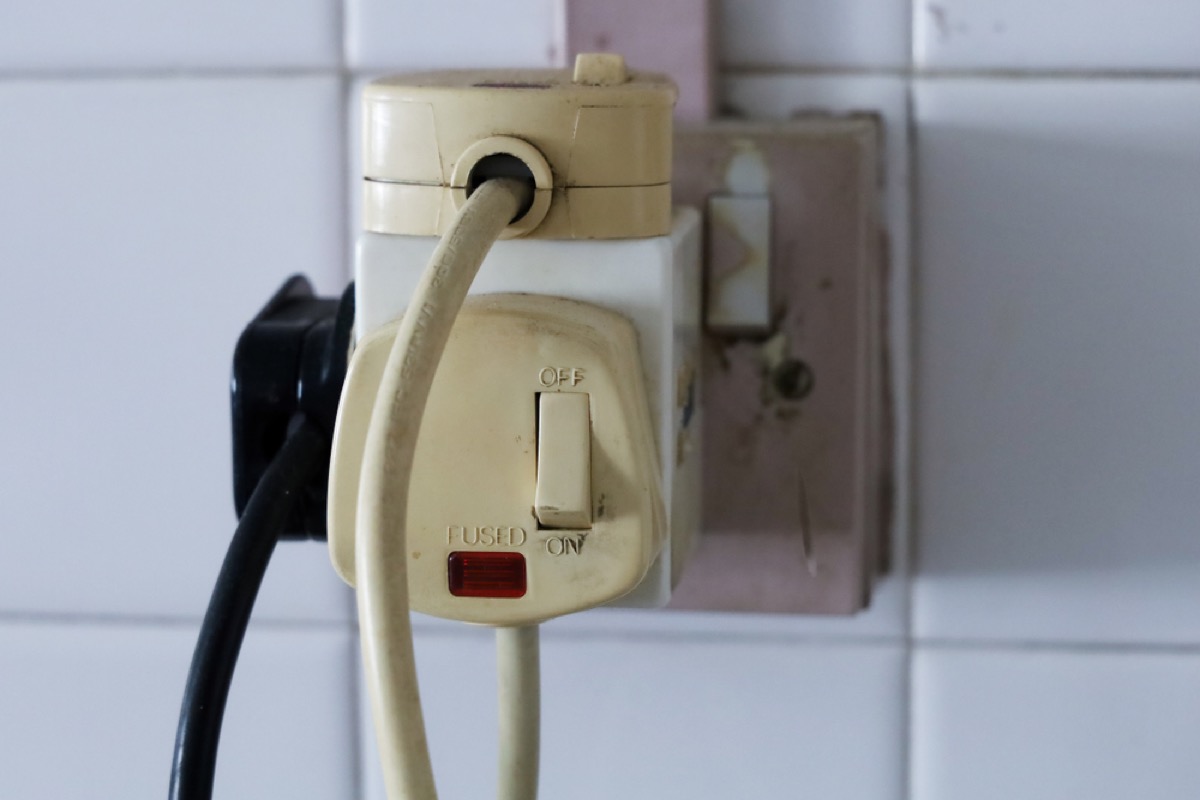
Simply adding an adaptor to an older two-prong outlet puts your home at risk every time you use one of these so-called "cheater plugs." "The ground wire is there for safety and simply bypassing it creates a potentially serious hazard," cautions Dawson, meaning it could spark an electrical fire or power surge. Instead, have an electrician replace the offending outlet if you need to use a three-pronged device.
34
Putting appliances near your thermostat
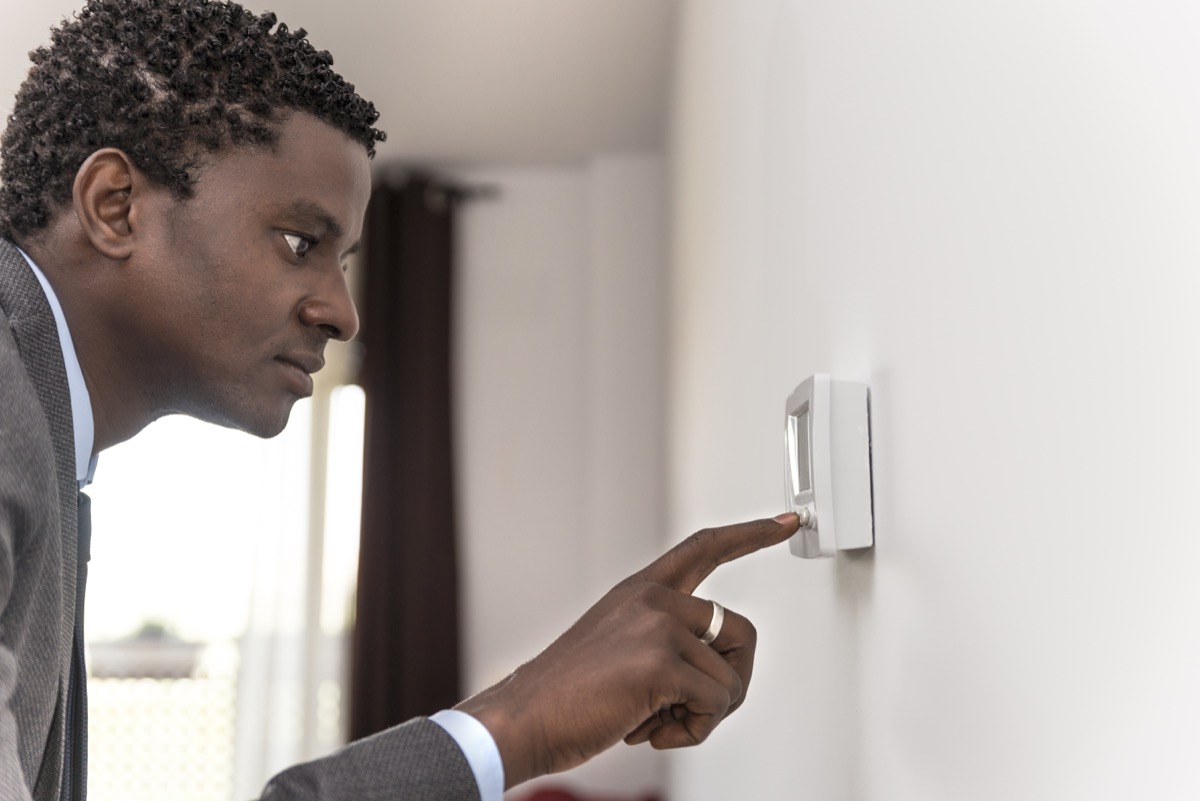
The placement of your appliances matters more than you might think. Since virtually all appliances emit some heat, if you place them to close to your thermostat, it "can register the rise in temperature and respond accordingly, leading to higher bills in the summer and a colder home in the winter," cautions Dawson.
35
Ignoring flickering lights
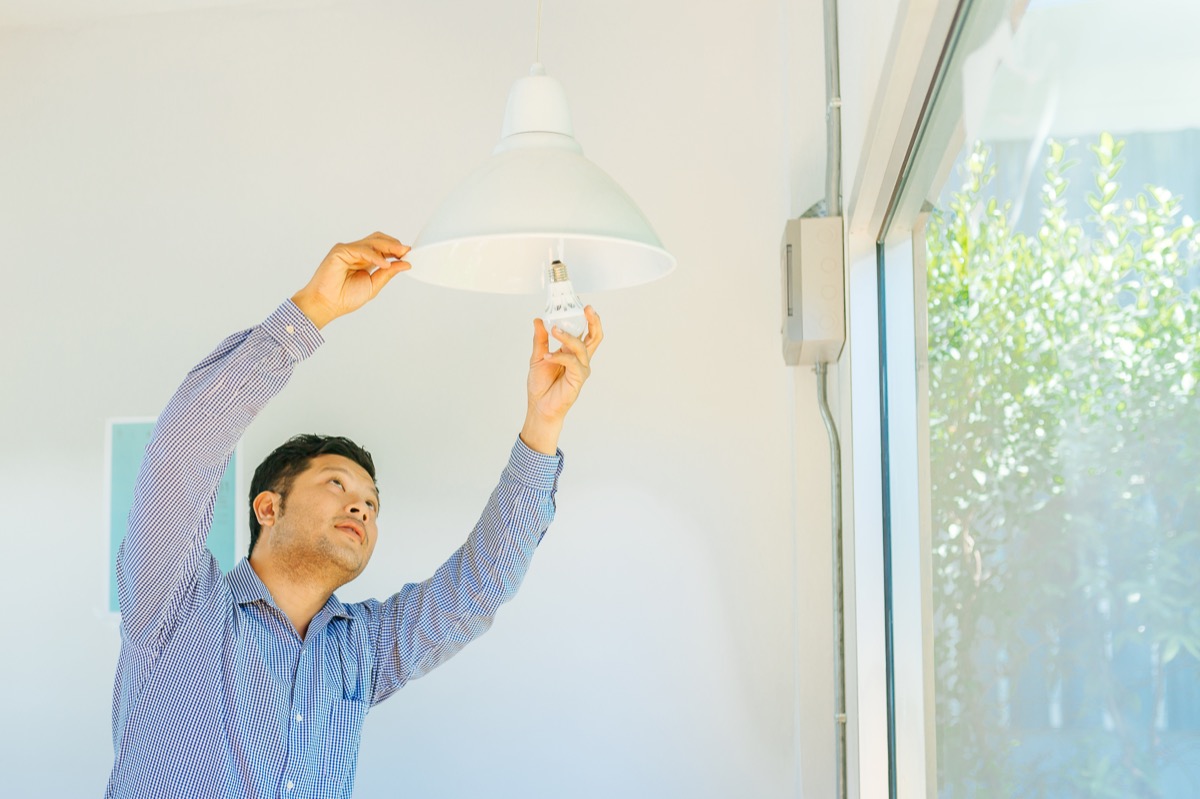
Those flickering lights aren't always just a quirk of your older home or the result of a faulty bulb—and letting them go unchecked can mean you're putting yourself at risk for serious danger. "A flickering light could also be an early warning sign of dangerous wiring problems," says Dawson. He recommends first checking that your bulb is screwed in correctly, and replacing it if the problem persists. If that doesn't seem to fix things, it's time to call an electrician.
36
Installing dimmers
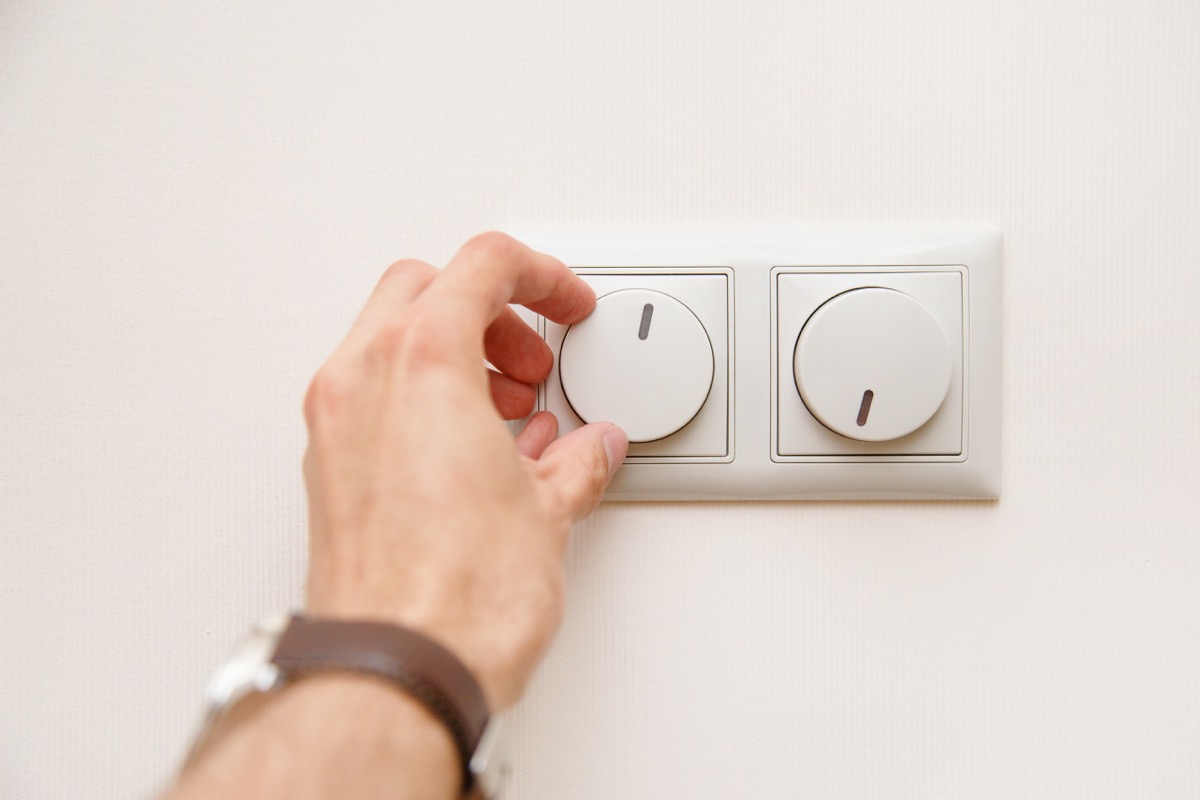
Creating mood lighting by installing dimmers throughout your house could land you with costly repairs if you're attempting to DIY the job.
"Dimmers typically have different color wires coming off of it and they are not all consistent," explains Garry Hall, a partner at Sunrise Electric. "When wired incorrectly, this will typically result in a short circuit."
37
Having cables drilled in through your home's exterior
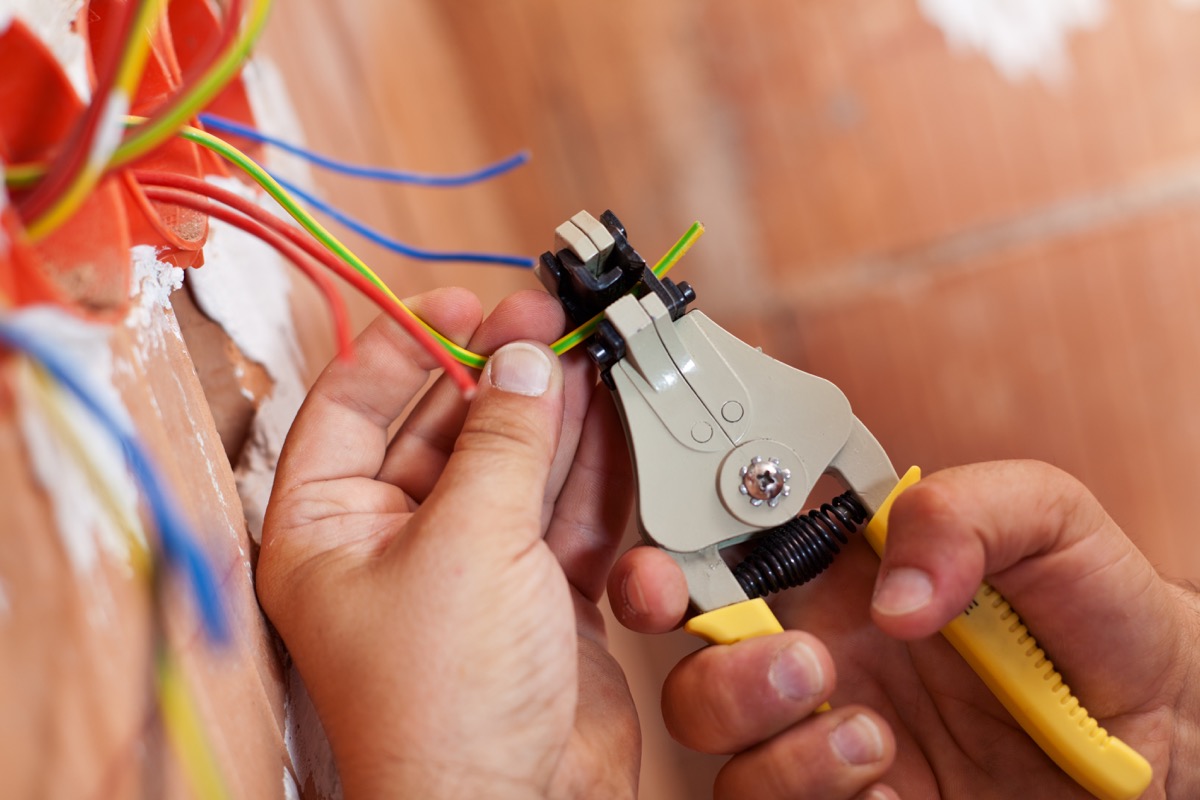
While you may need cables drilled into your home to provide access to TV or internet, DIYing it—or having a less-than-experienced installer do the job—can create major problems. "Improperly sealed wall penetration will slowly and invisibly rot wood and potentially attract damp wood termites," explains architect Colin Haentjens.
38
Not using your stove's exhaust hood
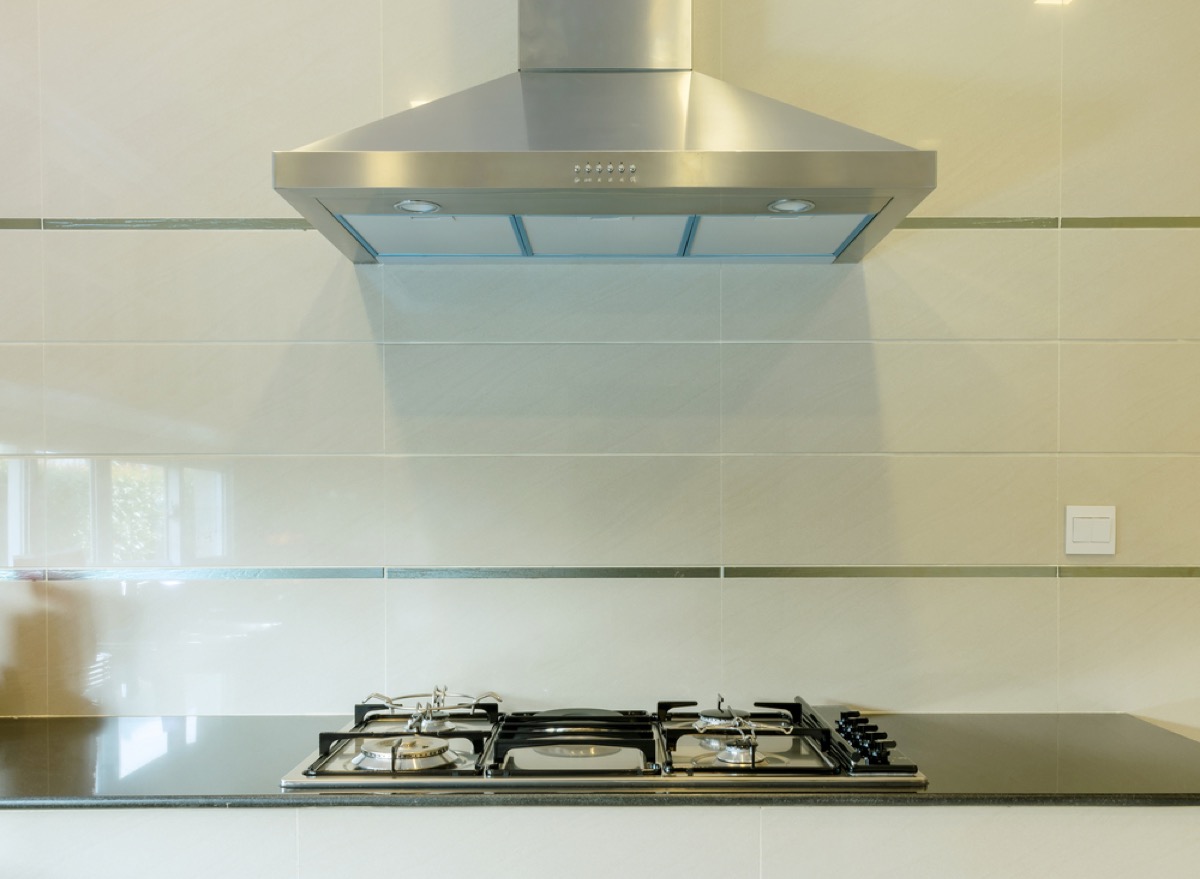
If you're not using your stove's vent hood, you could be compromising the quality of the air in your home. "Be sure to use a vented exhaust fan to remove cooking fumes and avoid moisture build-up," says Richard Ciresi, franchise owner of Aire Serv in Louisville, Kentucky.
He also recommends opening your windows while you cook to allow for cross-ventilation, reducing moisture, smoke, and improving your indoor air quality.
39
Continuing to use malfunctioning appliances
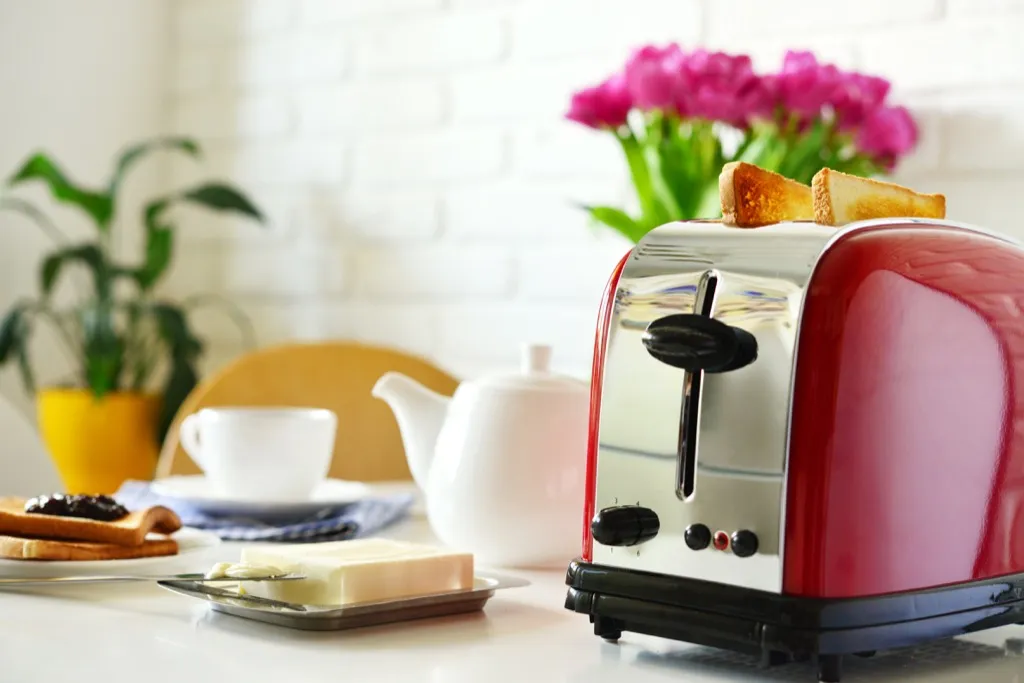
That toaster that's always on the fritz and that microwave that cuts power halfway through heating your food aren't as innocuous as they might seem. In fact, ignoring them may mean you're inadvertently damaging your whole home's electrical system. "The resulting damage can range from a tiny bit of wear and tear on other appliances to a destructive electrical fire," says Dawson.
40
Not having your chimney and fireplace routinely cleaned
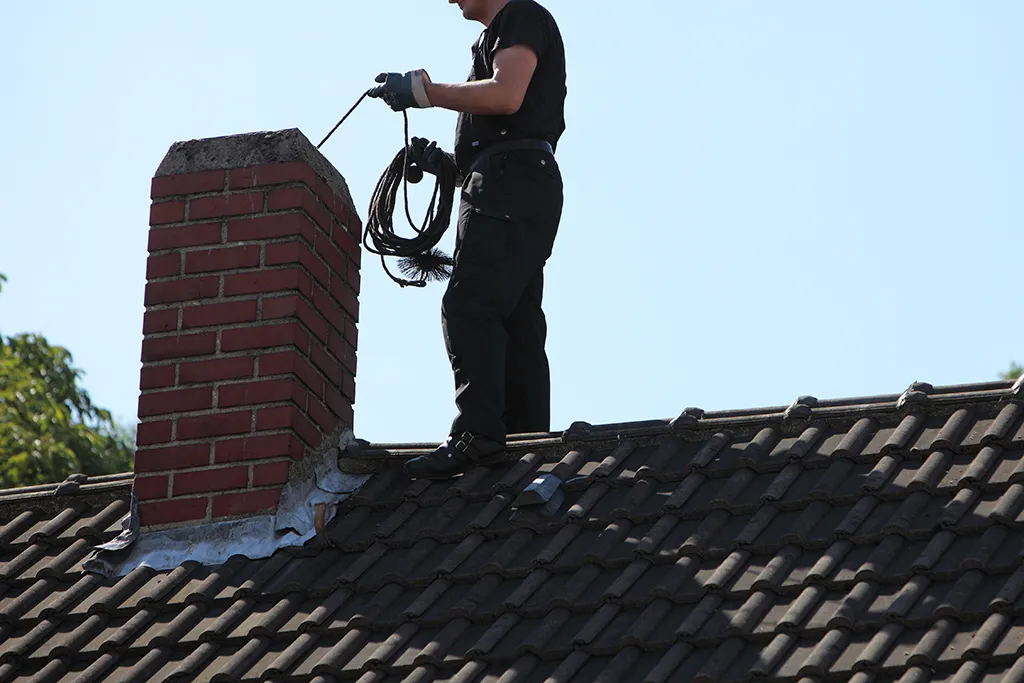
If you don't have your chimney cleaned with some frequency, creosote can build up inside it, putting you at risk for a chimney fire, as well as resulting in suboptimal indoor air quality. "The routine annual cleaning and inspection of your fireplace and venting system is essential," explains Ciresi. "Dirty, blocked, cracked, and leaking chimney flues and venting can result in the release of fireplace pollution in your home, as can improperly installed or incorrectly maintained components."
41
Power washing your roof
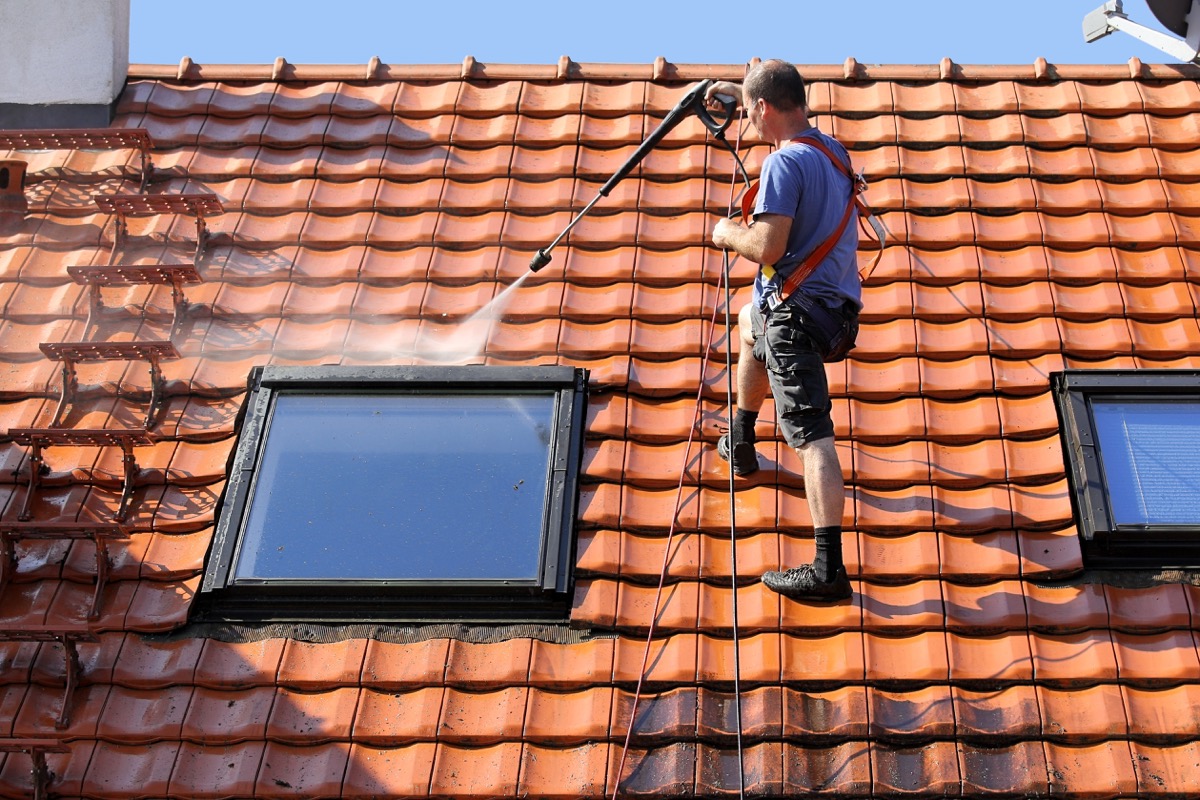
Just because power washing is good for your siding doesn't mean the same holds true for your roof. "If the granule on your shingle roof is blasted off with pressure washing, it'll leave your roof exposed to the elements and weaken your roof," explains James Otis, owner of Hometown Roofing ATX. Over time, this can even puncture your roof and create leaks inside your home.
42
Letting mildew grow on your roof
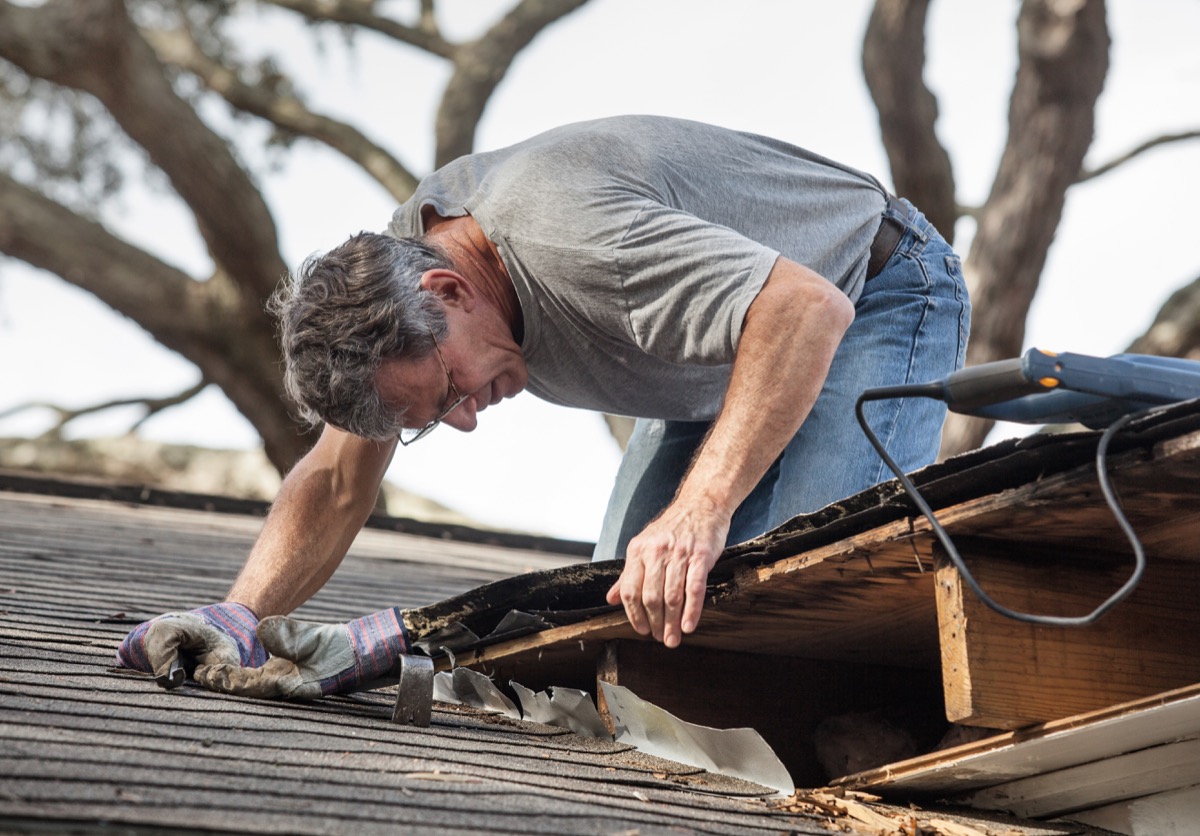
While you may think the look of that mossy roof is charming, if there's mildew underneath, you could be setting your home up for some serious damage. "Mold and mildew cause discoloration on your roof and weaken it," says Otis, noting that roof mildew is frequently a sign that something's wrong with your HVAC system.
43
Leaving pipes exposed in the winter
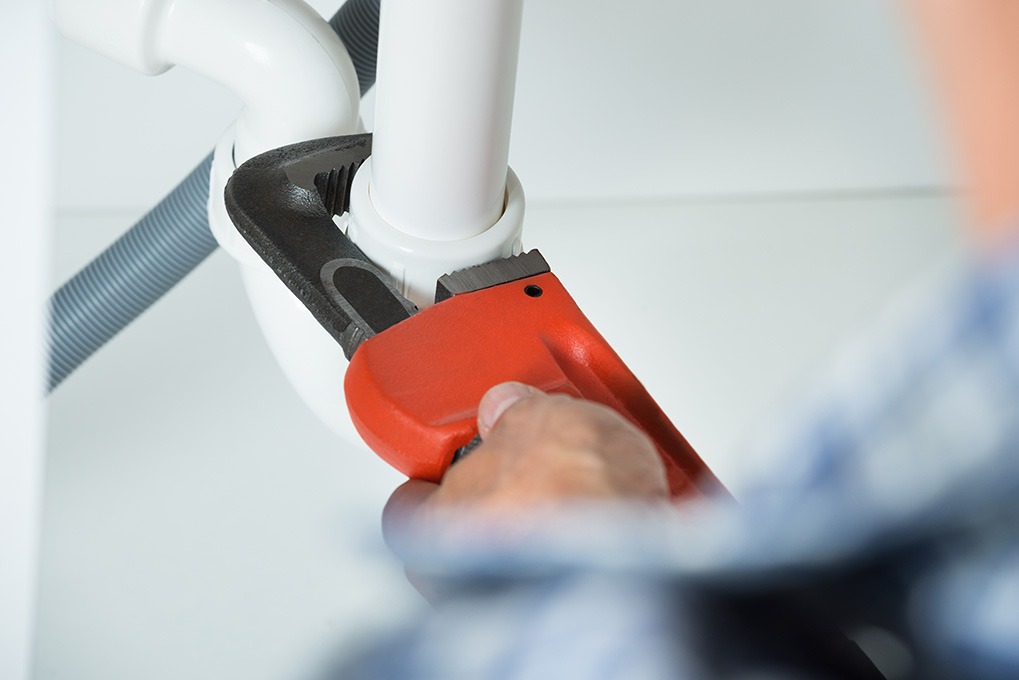
Those exposed pipes in your freezing cold basement deserve some insulation—and if you don't cover them, you could be putting your home at risk for some serious damage. "Any plumbing that goes through unheated parts of your home or is exposed to outdoors is liable to freeze and possibly burst," says Dawson.
44
Joining the wrong piping materials
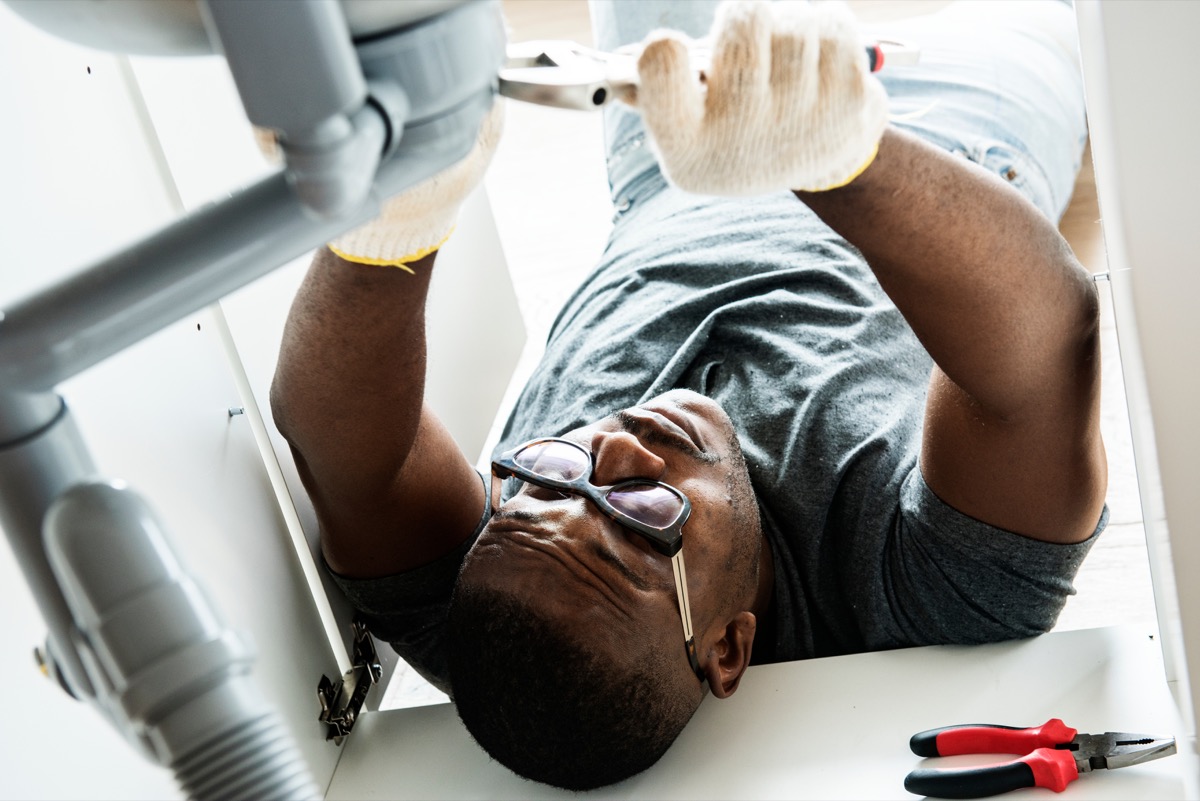
As tempting as it may be, you can't replace that leaky section of pipe with any old material. "Some types of plastic can't handle hot water and there are other materials you shouldn't match," Dawson says. For example, "copper connectors on galvanized metal pipes causes electrolysis," a common source of pipe corrosion and leaks.
45
Allowing the ground around your home to dry out
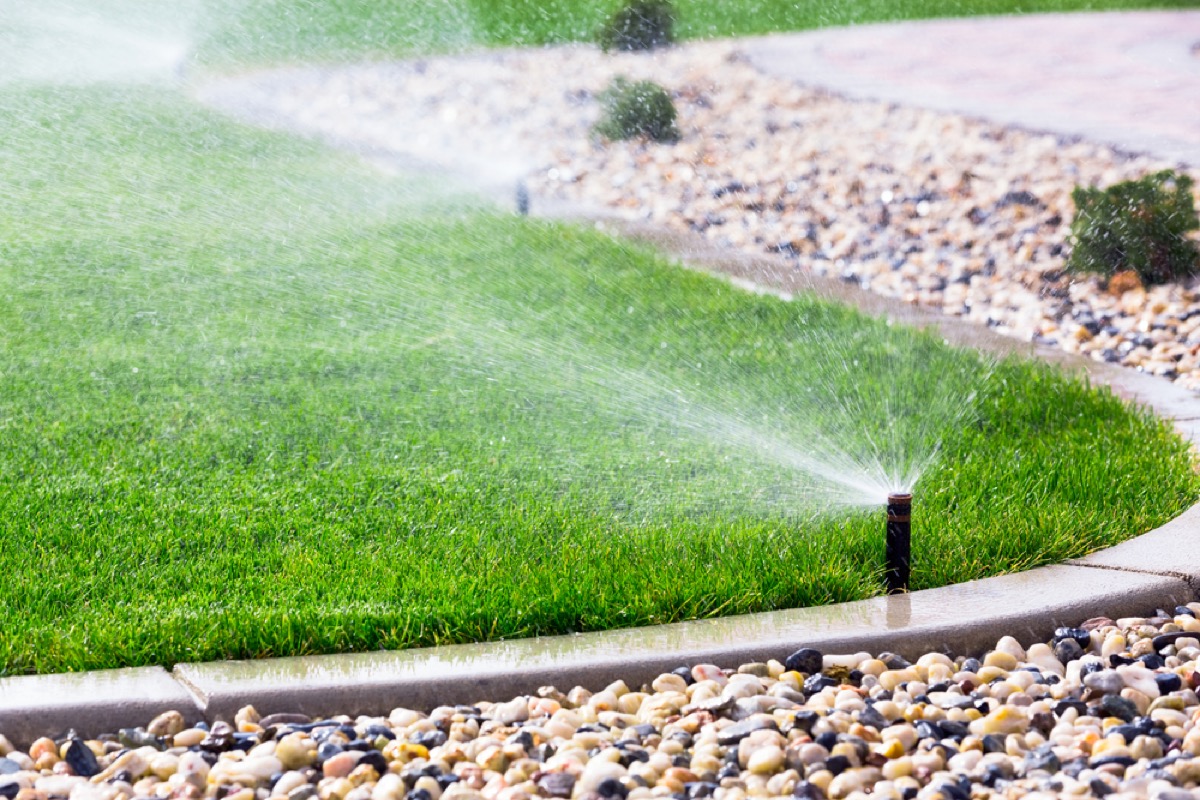
You know having too much water around your home's foundation can cause serious damage, but a Sahara-like environment isn't actually any better. "The ground is like a sponge and when it dries out, it shrinks, creating an unstable base for the entire foundation of the home," explains Betty Mooney, president of Brick Restoration, Inc., a Houston-based masonry repair and restoration company. Over time, this can lead to cracks in your home's foundation and may even allow water to seep inside. To keep this from happening, make sure to water the grass and dirt surrounding your home frequently—just not so often that water pools near your foundation.
46
Planting too close to your foundation
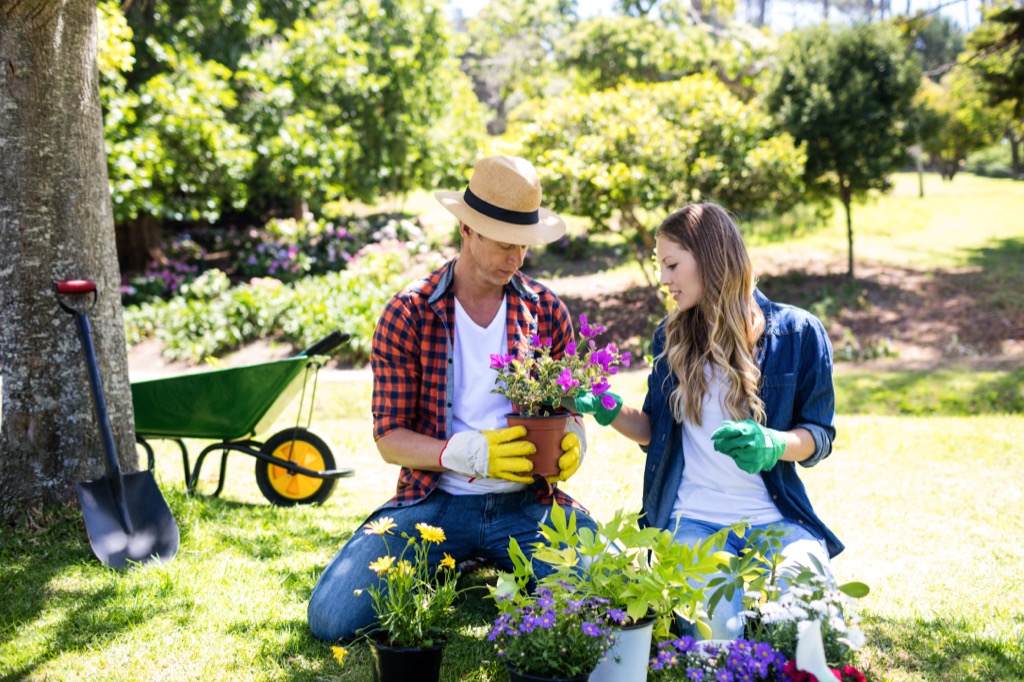
If you want to maintain the integrity of your home, make sure to leave some space between those pretty perennials and the house itself. Putting plants too close to your home can cause moisture damage to your foundation, or may even leave you dealing with root structures threatening to compromise it.
47
Placing your grill too close to your house

Who doesn't love grilling in the warmer months? But if you're putting your grill right up against your house, you could be putting yourself at risk. According to the National Fire Protection Association, charcoal and gas grills are responsible for 9,800 home fires in the United States each year. Not only does putting a hot grill near your home increase your risk of a house fire, it can also melt and warp your siding.
48
Leaving your attic uninsulated
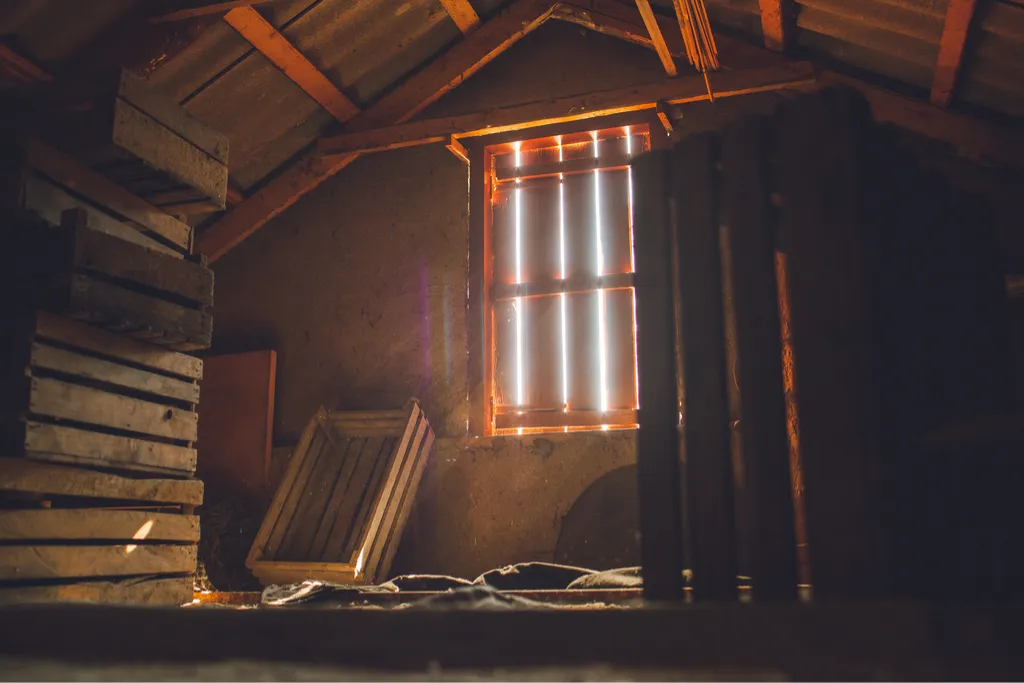
While your attic may only serve as storage space, if you're leaving it uninsulated, you're causing damage to your home and to your wallet. According to Energy Star, 25 percent of a home's heat can be lost through an uninsulated attic. So every year you fail to insulate, you're not only increasing your risk of burst pipes and other weather-related damage, but also increasing your electric bills.
49
Scrubbing walls with latex paint
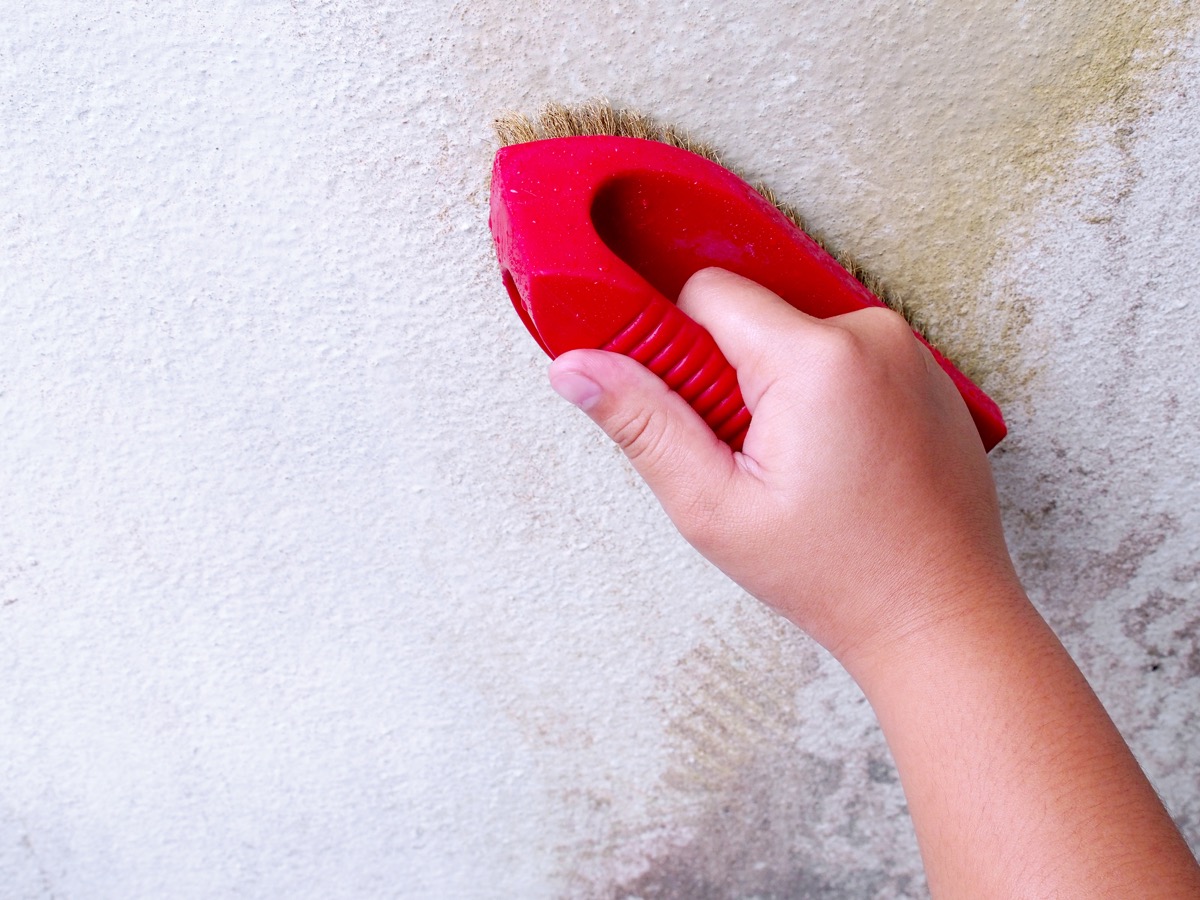
Sure, you might not like the masterpiece your little ones drew on your walls, but scrubbing it off will only do greater damage over time. "Some of the color may come off because of the rubbing," cautions Harriet Jones, cleaning supervisor for Go Cleaners London. Scrub further and you could even cause moisture damage to the drywall beneath.
50
Doing construction without getting permits
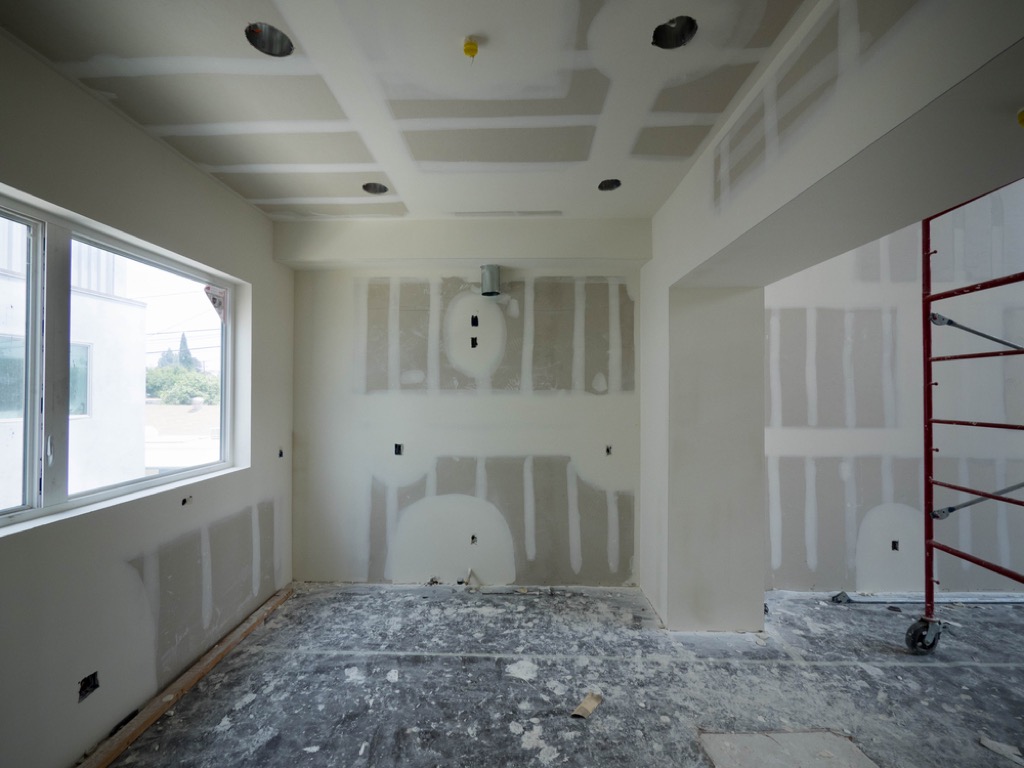
Though it may be tempting to DIY a larger job without securing permits, doing so could mean major trouble in the future. In addition to causing damage to your home, "if the city finds out that you're building without proper permits, they could fine you heavily, shut down construction, or even demand that project be torn down completely," says David Crompton, head of construction at Pro.com. A bad DIY job could also cause structural damage to your home, leading to foundation problems over time.


